| 1 |
|
|
Upcoming Book |
ID 27 Sustainable Livelihoods: Integrating agriculture with allied sectors for holistic rural development |
Open Access Book |
Coming soon |
Coming soon |
Background
The book emphasizes the need for an integrated approach, combining crop cultivation with livestock, fisheries, agroforestry, and value-added enterprises to enhance farmers' income and resilience. It discusses sustainable agricultural practices, climate-smart solutions, and modern technologies, ensuring environmental conservation while boosting productivity. Case studies highlight successful models of rural development, entrepreneurship, and cooperative frameworks that empower communities. The book also addresses policy interventions, financial support mechanisms, and capacity-building strategies to strengthen rural economies. It advocates for a participatory approach involving farmers, researchers, policymakers, and stakeholders to create self-sustaining, climate-resilient rural livelihoods. This comprehensive resource is ideal for policymakers, academicians, development practitioners, and students working toward holistic rural transformation through an integrated agricultural approach.
Tentative Titles/Themes of Chapter (New chapter titles may be proposed)
Theme 1: Foundations of Sustainable Livelihoods
-
Rethinking Rural Development: The Need for an Integrated Approach
-
The Future of Farming: Sustainability Beyond Crop Cultivation
-
Bridging the Gap: Agriculture, Livelihoods, and Economic Growth
-
Climate Resilience in Rural Livelihoods: Strategies for the Future
-
Sustainable Agriculture: A Blueprint for Prosperity
Theme 2: Crop Cultivation and Diversification
-
Beyond Monoculture: Diversified Farming for Resilient Livelihoods
-
Climate-Smart Agriculture: Innovations for a Changing World
-
Precision Farming: Harnessing Technology for Higher Yields
-
Organic and Natural Farming: The Road to Healthier Soils
-
Seed to Success: Enhancing Productivity Through Improved Varieties
Theme 3: Integrating Livestock for Economic Stability
-
Livestock Revolution: Enhancing Farm Incomes through Animal Husbandry
-
Dairy Development: The White Gold of Rural Prosperity
-
Poultry and Goatery: Small Livestock, Big Impact
-
Sustainable Feed and Fodder Management for Livestock Growth
-
Animal Health and Disease Management: Ensuring Productivity
Theme 4: Fisheries and Aquaculture for Livelihood Enhancement
-
Blue Revolution: Unlocking the Potential of Fisheries in Rural Economies
-
Integrated Fish Farming: A Model for Sustainable Livelihoods
-
Freshwater Aquaculture: Opportunities and Challenges
-
Cage and Recirculatory Aquaculture Systems: The Future of Fish Farming
-
Ornamental Fisheries and Pearl Farming: Profitable Alternatives
Theme 5: Agroforestry and Natural Resource Management
-
Trees on Farms: Agroforestry for Income and Ecosystem Stability
-
Bamboo and Medicinal Plants: Unexplored Wealth for Farmers
-
Water Conservation in Agriculture: Smart Irrigation for Sustainability
-
Soil Health Management: The Key to Long-Term Productivity
-
Sustainable Land Use: Balancing Agriculture and Ecology
Theme 6: Post-Harvest Management and Value Addition
-
Beyond the Farmgate: Post-Harvest Technologies for Minimizing Losses
-
Value Addition in Agriculture: From Raw Produce to Profitable Products
-
Agri-Processing and Rural Industries: Creating Jobs and Wealth
-
Cold Chains and Storage: Reducing Wastage, Maximizing Profits
-
Export-Oriented Farming: Leveraging Global Markets for Rural Growth
Theme 7: Rural Enterprises and Agribusiness Development
-
Agri-Entrepreneurship: Transforming Farmers into Business Leaders
-
Women in Agriculture: Empowering Rural Livelihoods
-
FPOs and Cooperatives: Strengthening Farmer Networks
-
Agri-Tourism: Turning Farms into Destinations
-
Digital Agriculture: Harnessing Technology for Rural Prosperity
Theme 8: Financial Inclusion and Market Linkages
-
Microfinance and Credit for Rural Entrepreneurs
-
Farm-to-Market Linkages: Strengthening Supply Chains
-
E-Commerce and Agri-Marketing: Tapping into Digital Marketplaces
-
Government Schemes and Policies for Sustainable Livelihoods
-
Public-Private Partnerships for Agricultural Development
Theme 9: Climate Change, Sustainability, and Policy Interventions
-
Climate Change and Its Impact on Rural Livelihoods
-
Carbon Farming: Turning Agriculture into a Climate Solution
-
The Role of Sustainable Energy in Agriculture
-
Strengthening Agri-Education and Skill Development
-
International Models of Sustainable Rural Development
Theme 10: The Road Ahead
-
Revitalizing Rural Economies: Lessons from Success Stories
-
The Role of Youth in Agriculture and Rural Development
-
Smart Villages: Integrating Technology for Holistic Growth
-
Sustainable Livelihood Models: Replicable Success Stories
-
A Vision for the Future: Policy, Innovation, and Collaboration
CHAPTER SUBMISSION PROCEDURE:
Book Chapter may be submitted through e-mail: bioticabooks@gmail.com
FOR ANY QUERIES:
Contact:+91-9863023086
Mail us: bioticabooks@gmail.com
Authors' Guidelines Publication Package
|
|
IMPORTANT DATES:
- Chapter booking ends: 25th April, 2025
- Chapter submission ends: 25th May, 2025
CHAPTER SUBMISSION PROCEDURE:
Book Chapter may be submitted through e-mail: bioticabooks@gmail.com
FOR ANY QUERIES:
Contact:+91-9863023086
Mail us: bioticabooks@gmail.com
Authors' Guidelines Publication Package
|
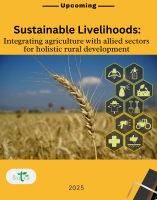 |
2025-03-26 03:03:14 |
Edit |
Delete |
| 2 |
|
|
Upcoming Book |
ID 22 Innovations in Aquaculture: Emerging Trends and Sustainable Practices |
D.K. Meena, Soibam Khogen Singh, Sachin Onkar Khairnar, Jham Lal, Girija Saurabh Behere, Sourabh Debbarma |
Coming soon |
Coming soon |
Background
The aquaculture industry is rapidly evolving to meet the demands of a growing global population, while also addressing the environmental and social challenges associated with traditional aquaculture practices. This book provides a comprehensive overview of the latest innovations and emerging trends in aquaculture, covering topics such as sustainable aquaculture systems, water quality management, and disease prevention and control. The book aims to provide a platform for knowledge sharing and collaboration among researchers, policymakers, and industry stakeholders to promote the development of a sustainable and responsible aquaculture industry.
List of Chapters:
- Technological Innovations in Aquaculture System Design
- Water Quality Management in Recirculating Aquaculture Systems
- Economic Feasibility and Scalability of Recirculating Systems
- Cutting-Edge Sensor Technologies for Real-Time Water Quality Monitoring
- Biological Indicators for Aquaculture Water Quality Management
- Integration of IoT and Data Analytics in Aquaculture Water Quality
- Carbon Footprint and Greenhouse Gas Emissions in Aquaculture
- Innovative Strategies for Waste Reduction and Recycling in Aquaculture
- Certification and Eco-Labelling for Sustainable Aquaculture Practices
- Nitrogen and Phosphorus Dynamics in Aquaculture: Principles and Applications
- Biotic and Abiotic Factors in Aquaculture Nutrient Management
- Innovative Nutrient Management Techniques for Sustainable Aquaculture
- Alternatives to Fishmeal and Fish Oil in Aquaculture Feeds
- Plant-Based and Insect-Based Feed Innovations in Aquaculture
- Cutting-Edge Feed Formulation and Production Techniques
- Vaccination and Immunostimulants in Aquaculture: Advances and Applications
- Pathogen Detection and Diagnostic Techniques in Aquaculture
- Quarantine and Biosecurity Measures in Modern Aquaculture
- Genome Editing and Applications in Aquaculture
- Genetic Mapping and Marker-Assisted Selection in Aquaculture
- Genetic Diversity and Ecosystem Stability in Aquaculture
- Conservation Strategies for Wild Populations in Aquaculture
- Enhancing Biodiversity Through Sustainable Habitat Management
Note:
- Chapter title may be modified or new chapter may also be proposed by the author.
- Green colour marked chapters are already booked
Lead Editor
Dr. D.K. Meena
Dr. D. K. Meena, Senior Scientist working at ICAR-Central Inland Fisheries Research Institute, Barrackpore, Kolkata, India. Dr. Meena has in his credit more than 60 international, 10 national peer reviewed articles, 30 book chapters, more than 50 popular articles. In addition, he is member of Editorial board of Research Biotica, Review Editor of Frontiers in Aquatic Physiology, sectional Editor, and World Journal of Food Science and Technology, Editorial Board member, Biotica Research Today (BRT), Editorial Board member Biotica journal, Editorial Board Member of Agriculture and Food Newsletter. Associate Editor International Journal of Zoological Investigation. Editor a book on Organic farming (Second Edition): Global Perspectives and Methods. Lead Guest Editor of ESPR Special issue on “Valorization of agroindustry and seafood waste towards blue economy: a waste to wealth concept”. Lead Guest Editor for a Special Issue on “Fisheries, Aquaculture and Agricultural Sustainability: Global Perspectives and Methods” in Biotica journal. Working as Topical Advisory Panel member of Fishes, water and life MDPI journals. Appointed as Academic Editor PLOSONE and Advances in Agriculture. Associate Editor International Aquatic Research, Food Science and Nutrition Technology, Aquaculture Science and Management. Guest editor in Frontiers in aquaculture. Also nominated as an editor Journal of Inland Fisheries Society of India (JIFSI) and Global Journal of Fisheries Science. Recently appointed as a Consulting Editor, Journal of Environmental Biology (JEB). Also joined as an Editorial Board Member Asian Journal of Fisheries and Aquatic Sciences (AJFAS). Also joined as EBM in Aquaculture International Journal, BMC Environmental Science, BMC Blue Biotechnology, BMC Aquaculture Science and Management, Discover Biotechnology, Discover Animal, NPJ sustainable Agriculture, Discover Foods. Dr. Meena conferred with Young Scientist Award from Academy of Environmental Biology, Fellow of Environmental Biology, Fellow of Fisheries and Life Sciences, Fellow of Society of Biotic and Environmental Research, Fellow of Zoological Society of India. Best Presentation awards in international and national forums. Dr. Meena is working more than 10 years on conversion of waste to wealth which is witnessed by his publication in high impact journals and also commercialized brewery waste-based fish feed, silk work pupae waste-based fish feed and developed Black solder fly (BSF) based fish feed technology. Dr. Meena acted as expert member of many high-level committee of Govt of India.
Associate Editors
Dr. Soibam Khogen Singh is currently working as Senior Scientist &Head of the Krishi Vigyan Kendra under the ICAR Research Complex for NEH Region, India. He completed his graduation from the Faculty of Fishery Science, West Bengal University of Animal and Fisheries Sciences, Kolkata, India, postgraduation from the Fisheries College and Research Institute, Tamil Nadu Veterinary and Animal Sciences University, Chennai, India, and doctoral degree from Central Institute of Fisheries Education, Mumbai, India. His area of research is alternative feed bio-resources, biofloc technology, fish immunology and culture of live food organisms. He has to his credit more than 35 peer reviewed research publications in high-impact journals. He is currently associated in 5 mega research projects, and also attained faculty foreign training at James Cook University, Singapore as a part of the IDP-NAHEP funded by the World Bank. He has been recognised by several national forums/organisations in the form of 3 awards.
Dr. Sachin Onkar Khairnar
Dr. Sachin Onkar Khairnar serves as an Associate Professor at the College of Fisheries, Bihar Animal Sciences University in Kishanganj. Prior to joining this institution, he held various positions at the College of Fisheries, Guru Angad Dev Veterinary and Animal Sciences University (Ludhiana), Central Institute of Freshwater Aquaculture (Bhubaneswar), and Fishery Survey of India (Mumbai). Dr. Khairnar obtained his PhD in Aquaculture from the Ocean University of China, Qingdao, and his M.F.Sc in Aquaculture from the College of Fisheries, Ratnagiri, Dr. Balasaheb Sawant Konkan Krishi Vidyapeeth, Dapoli, India. Dr Khairnar is an aquaculture expert with 13 years of experience in the breeding and rearing of indigenous and exotic varieties of carp, catfish, and ornamental fishes, as well as their feed, health, and water quality management. He is working on selective breeding, sex-reversal technology, improving fish pigmentation in ornamental fishes, and developing low-cost technologies for farmers. He has published over 50 research papers, guided 28 students as major and minor advisors, and developed low-cost ornamental fish culture and breeding units. He, along with his team, has successfully completed the ICAR-EL project on ornamental fishes in business mode at the College of Fisheries, Ludhiana, and was associate in NSPAAD at GADVASU (Ludhiana), and AICRP-PEASEM at PAU (Ludhiana). He has received several awards, including the Chinese Government Scholarship, the Young Scientist Award, and the Best Teacher Award.
Dr. Jham Lal
Dr. Jham Lal is working as assistant Professor with a notable publication record, including 4 book chapters, 2 research articles, and 27 popular articles. He has presented his work at 5 international and 5 national conferences, and has received several awards, including the Best Paper Presentation Award (2024), Best Research Scholar Award (2023), and Young Achiever Award (2023). He has also undergone training in Sophisticated Instruments (2022) and Ecology and Fisheries (2022), and possesses skills in Microsoft Office and SPSS Software. He is a member of several professional societies, including NESFA, ISAHRD, ATDS, and AEDS. Born on 06/09/1992, he is single and has a permanent address in Village-Masna, Mungeli, Chhattisgarh, with a correspondent address at ICAR-CIFRI, Barrackpore, Kolkata.
Dr. Girija Saurabh Behere
Dr. Girija Phadke-Behere is currently working as Assistant Professor in Fish Processing Technology Division in College of Fisheries, Datia, Rani Lakshmi Bai Central Agricultural University, Jhansi. She is distinguished in academics and researcher with a strong background in Fish Processing Technology. She holds a PhD from Karnataka Veterinary, Animal and Fisheries Sciences University, Bidar, and has received numerous awards and recognitions for her academic excellence, including the DST-INSPIRE Fellowship, Dr. Balasaheb Sawant Konkan Krishi Vidyapeeth Gold Medals, Research Excellence Award, Academic Excellence Award, Chancellor Award. With over 12 years of experience in research and extension, Dr. Behere has worked on various projects, including AICRP on Integrated Farming Systems, Development of pictorial guidelines for freshness of fish species, species-specific technologies for improved utilization of fishery resources, thermal and non-thermal technologies for processing and packaging of fish products, and innovative product development for value addition and nutrient fortification. She has published 30 research papers in international and national peer- reviewed journals, authored two books, edited one book and contributed to several book chapters/ manuals and having more than 30 popular articles to her credit. She organized over 200 harbour-based, dry fish development and seafood unit trainings for fishers, fisherwomen, focussing on fish quality management and sustainable fishing during her service in MPEDA-NETFISH. Also organized >15 workshops on Seafood value addition for livelihood generation. She also coordinated for a visit of Indian fishermen to the World Trade Organization in Geneva, Switzerland to advocate for fisheries subsidies and worked as Ornamental Fish Health Certification Officer for export of ornamental fish to various countries.
Mr. Sourabh Debbarma
Mr. Sourabh Debbarma obtained his degree of Bachelor of Fisheries Science (B.F.Sc.) in the year 2019 and Master of Fisheries Science (M.F.Sc.) in Aquatic Animal Health, in the year 2021 from College of Fisheries, Central Agricultural University (Imphal), Lembucherra, Tripura, India. He is currently pursuing his Ph.D. at Fisheries College and Research Institute, Tamil Nadu Dr. J. Jayalalithaa Fisheries University, Nagapattinam, Tamil Nadu. He worked for more than a year as a Junior Research Fellow under “Wolffia Project” which was funded by DBT, India, at the College of Fisheries, CAU (I) Lembucherra, Tripura (West), India. Also, he was given the Arup Nath Memorial Award and recognized as receiving the Best M.F.Sc. Thesis 2021 at the International Conference RASHI-2022.His works have published in several national and international journals comprising research articles, review articles, popular articles and book chapters.
CHAPTER SUBMISSION PROCEDURE:
Book Chapter may be submitted through e-mail: bioticabooks@gmail.com
FOR ANY QUERIES:
Contact:+91-9863023086
Mail us: bioticabooks@gmail.com
Authors' Guidelines Publication Package
|
|
IMPORTANT DATES:
- Chapter booking ends: 15th March, 2025
- Chapter submission ends: 15th April, 2025
CHAPTER SUBMISSION PROCEDURE:
Book Chapter may be submitted through e-mail: bioticabooks@gmail.com
FOR ANY QUERIES:
Contact:+91-9863023086
Mail us: bioticabooks@gmail.com
Authors' Guidelines Publication Package
|
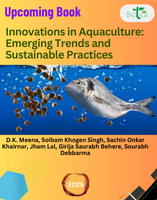 |
2025-02-26 15:40:44 |
Edit |
Delete |
| 3 |
|
|
Upcoming Book |
ID 20 Sustainable Aquaculture: Concepts & Benefits |
D.K. Meena, Binod Choudhury, Sachin Onkar Khairnar, Soibam Khogen Singh, Nitesh Kumar Yadav, Sourabh Debbarma |
Coming soon |
Coming soon |
Background
The world's population is projected to reach 9.7 billion by 2050, putting immense pressure on the global food system to produce more food while minimizing its environmental footprint. Aquaculture, the practice of farming aquatic animals and plants, has emerged as a vital component of the global food system, providing a sustainable source of protein for millions of people. However, the rapid growth of the aquaculture industry has also raised concerns about its environmental and social impacts. In response to these challenges, the concept of sustainable aquaculture has gained significant attention in recent years. Sustainable aquaculture refers to the practice of farming aquatic animals and plants in a way that minimizes harm to the environment, conserves natural resources, and promotes social responsibility. This book provides a comprehensive overview of sustainable aquaculture practices, covering various themes and topics that are essential for the development of a sustainable and responsible aquaculture industry. The book is divided into 6 themes, each consisting of three chapters that delve into the concepts, benefits, and best practices of sustainable aquaculture. The themes cover a range of topics, including integrated multi-trophic aquaculture, land-based systems, saline environments, cage aquaculture, animal health and welfare, and climate change. The book also explores the social and economic benefits of sustainable aquaculture, including its potential to provide livelihoods for millions of people and contribute to food security. The book is intended for a wide range of audiences, including aquaculture practitioners, researchers, policymakers, and students. It provides a valuable resource for anyone interested in learning about sustainable aquaculture practices and their potential to contribute to a more sustainable and food-secure future.
List of Chapters
- Integrated Multi-Trophic Aquaculture: Concepts and Case Studies
- Economic and Environmental Benefits of IMTA Systems
- Designing and Optimizing Efficient IMTA Systems: Innovations and Insights
- Land-Based Aquaculture: Closed Recirculating Systems (RAS) and Beyond
- Advances in Integrating Aquaponics and Hydroponics for Sustainable Aquaculture
- Innovative Water Recycling and Waste Management in Land-Based Aquaculture
- Navigating Saline Environments: Aquaculture Challenges and Innovations
- Saline-Tolerant Species: Opportunities and Management Strategies
- Successful Case Studies of Aquaculture in Salt-Affected Areas
- Cage Aquaculture: Environmental Impact and Management
- Innovations in Cage Design and Sustainable Materials
- Best Practices for Cage Aquaculture Maintenance and Management
- Health Monitoring and Diagnostic Tools for Aquatic Animals
- Prophylactic and Therapeutic Treatments in Aquaculture
- Welfare Standards and Ethical Considerations in Aquaculture
- Climate Resilience in Aquaculture: Species and Systems
- Predictive Modelling for Climate Impact Assessment in Aquaculture
- Policy and Governance for Climate Adaptation in Aquaculture
Note:
- Chapter title may be modified or new chapter may also be proposed by the author.
- Green colour marked chapters are already booked
Lead Editor
Dr. D.K. Meena
Dr. D. K. Meena, Senior Scientist working at ICAR-Central Inland Fisheries Research Institute, Barrackpore, Kolkata, India. Dr. Meena has in his credit more than 60 international, 10 national peer reviewed articles, 30 book chapters, more than 50 popular articles. In addition, he is member of Editorial board of Research Biotica, Review Editor of Frontiers in Aquatic Physiology, sectional Editor, and World Journal of Food Science and Technology, Editorial Board member, Biotica Research Today (BRT), Editorial Board member Biotica journal, Editorial Board Member of Agriculture and Food Newsletter. Associate Editor International Journal of Zoological Investigation. Editor a book on Organic farming (Second Edition): Global Perspectives and Methods. Lead Guest Editor of ESPR Special issue on “Valorization of agroindustry and seafood waste towards blue economy: a waste to wealth concept”. Lead Guest Editor for a Special Issue on “Fisheries, Aquaculture and Agricultural Sustainability: Global Perspectives and Methods” in Biotica journal. Working as Topical Advisory Panel member of Fishes, water and life MDPI journals. Appointed as Academic Editor PLOSONE and Advances in Agriculture. Associate Editor International Aquatic Research, Food Science and Nutrition Technology, Aquaculture Science and Management. Guest editor in Frontiers in aquaculture. Also nominated as an editor Journal of Inland Fisheries Society of India (JIFSI) and Global Journal of Fisheries Science. Recently appointed as a Consulting Editor, Journal of Environmental Biology (JEB). Also joined as an Editorial Board Member Asian Journal of Fisheries and Aquatic Sciences (AJFAS). Also joined as EBM in Aquaculture International Journal, BMC Environmental Science, BMC Blue Biotechnology, BMC Aquaculture Science and Management, Discover Biotechnology, Discover Animal, NPJ sustainable Agriculture, Discover Foods. Dr. Meena conferred with Young Scientist Award from Academy of Environmental Biology, Fellow of Environmental Biology, Fellow of Fisheries and Life Sciences, Fellow of Society of Biotic and Environmental Research, Fellow of Zoological Society of India. Best Presentation awards in international and national forums. Dr. Meena is working more than 10 years on conversion of waste to wealth which is witnessed by his publication in high impact journals and also commercialized brewery waste-based fish feed, silk work pupae waste-based fish feed and developed Black solder fly (BSF) based fish feed technology. Dr. Meena acted as expert member of many high-level committee of Govt of India.
Associate Editors
Dr. Binod Choudhury
Dr. Binod Kumar Choudhary is a Principal Scientist (Fish & Fisheries Sciences) at ICAR-NIBSM, Raipur, with 17 years of experience in research and development in ICAR institutions. He holds a Ph.D. in Fisheries Biotechnology from ICAR-CIFE, Mumbai, an M.F.Sc. in Fish Genetics and Biotechnology from ICAR-CIFE, Mumbai, and a B.F.Sc. from College of Fisheries, Mangalore (UAS, Bangalore). His research expertise includes fish genetics, biotechnology, and disease management, and he has developed standard protocols for selective breeding of rohu and sequenced whole mitochondrial genome of rohu and mrigal. He has also isolated and characterized bacterial pathogens from fish and animals, including first reports of Raoultella ornithinolytica and Chromobacterium species from India. Additionally, he has developed an automated computational pipeline for identifying microsatellites in mitochondrial genomes. Dr. Choudhary has authored over 50 research publications, including research papers, review articles, and book chapters, and has published in peer-reviewed journals such as Current Science and Mitochondrion. He has received several awards and recognition, including the Young Scientist Award from Society of Biological Sciences and Rural Development, Allahabad, Best Poster Presentation Award in X Agricultural Science Congress and 9th Indian Fisheries Forum, Best Research Paper Award from ICAR-NIBSM, Raipur, and Best Scientist Institutional Award of ICAR-NIBSM, Raipur.
Dr. Sachin Onkar Khairnar
Dr. Sachin Onkar Khairnar serves as an Associate Professor at the College of Fisheries, Bihar Animal Sciences University in Kishanganj. Prior to joining this institution, he held various positions at the College of Fisheries, Guru Angad Dev Veterinary and Animal Sciences University (Ludhiana), Central Institute of Freshwater Aquaculture (Bhubaneswar), and Fishery Survey of India (Mumbai). Dr. Khairnar obtained his PhD in Aquaculture from the Ocean University of China, Qingdao, and his M.F.Sc in Aquaculture from the College of Fisheries, Ratnagiri, Dr. Balasaheb Sawant Konkan Krishi Vidyapeeth, Dapoli, India. Dr Khairnar is an aquaculture expert with 13 years of experience in the breeding and rearing of indigenous and exotic varieties of carp, catfish, and ornamental fishes, as well as their feed, health, and water quality management. He is working on selective breeding, sex-reversal technology, improving fish pigmentation in ornamental fishes, and developing low-cost technologies for farmers. He has published over 50 research papers, guided 28 students as major and minor advisors, and developed low-cost ornamental fish culture and breeding units. He, along with his team, has successfully completed the ICAR-EL project on ornamental fishes in business mode at the College of Fisheries, Ludhiana, and was associate in NSPAAD at GADVASU (Ludhiana), and AICRP-PEASEM at PAU (Ludhiana). He has received several awards, including the Chinese Government Scholarship, the Young Scientist Award, and the Best Teacher Award.
Dr. Soibam Khogen Singh
Dr. Soibam Khogen Singh is currently working as Senior Scientist &Head of the Krishi Vigyan Kendra under the ICAR Research Complex for NEH Region, India. He completed his graduation from the Faculty of Fishery Science, West Bengal University of Animal and Fisheries Sciences, Kolkata, India, postgraduation from the Fisheries College and Research Institute, Tamilnadu Veterinary and Animal Sciences University, Chennai, India, and doctoral degree from Central Institute of Fisheries Education, Mumbai, India. His area of research is alternative feed bio-resources, biofloc technology, fish immunology and culture of live food organisms. He has to his credit more than 35 peer reviewed research publications in high-impact journals. He is currently associated in 5 mega research projects, and also attained faculty foreign training at James Cook University, Singapore as a part of the IDP-NAHEP funded by the World Bank. He has been recognised by several national forums/organisations in the form of 3 awards.
Mr. Nitesh Kumar Yadav
Mr. Nitesh Kumar Yadav is a Researcher in Department of Aquaculture at the College of Fisheries, CAU (I), Agartala, India. He holds a Master's degree in Aquaculture and a Bachelor's degree in Fisheries Science from MPUAT, Udaipur, Rajasthan. With a strong academic background, Nitesh has demonstrated exceptional talent and commitment, earning accolades such as the Young Achiever Award, Excellence Award, and Best Oral Presentation Award at international conferences. He has also published over 40 scientific publications, including research articles, reviews, and book chapters, in prestigious national and international journals. As a Teaching Assistant and Research Fellow, Nitesh has gained valuable experience in teaching, research, and aquaculture practices. His research interests include aquatic species metabolism, stress response, and fish nutrition. With a strong passion for advancing aquaculture, Nitesh is committed to contributing to the global scientific community and promoting sustainable aquaculture practices.
Mr. Sourabh Debbarma
Mr. Sourabh Debbarma obtained his degree of Bachelor of Fisheries Science (B.F.Sc.) in the year 2019 and Master of Fisheries Science (M.F.Sc.) in Aquatic Animal Health, in the year 2021 from College of Fisheries, Central Agricultural University (Imphal), Lembucherra, Tripura, India. He is currently pursuing his Ph.D. at Fisheries College and Research Institute, Tamil Nadu Dr. J. Jayalalithaa Fisheries University, Nagapattinam, Tamil Nadu. He worked for more than a year as a Junior Research Fellow under “Wolffia Project” which was funded by DBT, India, at the College of Fisheries, CAU (I) Lembucherra, Tripura (West), India. Also, he was given the Arup Nath Memorial Award and recognized as receiving the Best M.F.Sc. Thesis 2021 at the International Conference RASHI-2022.His works have published in several national and international journals comprising research articles, review articles, popular articles and book chapters.
CHAPTER SUBMISSION PROCEDURE:
Book Chapter may be submitted through e-mail: bioticabooks@gmail.com
FOR ANY QUERIES:
Contact:+91-9863023086
Mail us: bioticabooks@gmail.com
Authors' Guidelines Publication Package
|
|
IMPORTANT DATES:
- Chapter booking ends: 15th March, 2025
- Chapter submission ends: 15th April, 2025
CHAPTER SUBMISSION PROCEDURE:
Book Chapter may be submitted through e-mail: bioticabooks@gmail.com
FOR ANY QUERIES:
Contact:+91-9863023086
Mail us: bioticabooks@gmail.com
Authors' Guidelines Publication Package
|
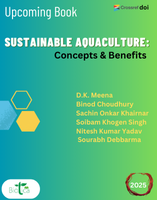 |
2025-02-25 17:09:11 |
Edit |
Delete |
| 4 |
|
|
Upcoming Book |
ID 19 Innovations in Sustainable Aquaculture: Emerging Trends and Best Practices |
D.K. Meena, Girija Saurabh Behere, Naresh Mehta, Sudhanshu Raman, Jham Lal, Shimanku Borah |
Coming soon |
Coming soon |
Background
The aquaculture industry is facing numerous challenges, including environmental degradation, water pollution, and climate change, which threaten the sustainability of this vital food source. In response, researchers and practitioners are developing innovative solutions to address these challenges and promote sustainable aquaculture practices. This book provides a comprehensive overview of the latest trends and best practices in sustainable aquaculture, covering topics such as aquaponics, algae-based bioremediation, microbiomes, bioengineering, and circular economy concepts. The book aims to provide a platform for knowledge sharing and collaboration among researchers, policymakers, and industry stakeholders to promote the development of a sustainable and responsible aquaculture industry.
List of Chapters:
- Integrating Aquaculture and Hydroponics: Aquaponics Systems
- Benefits of Aquaponics for Food Security and Sustainability
- Design and Management of Innovative Aquaponics Systems
- Nutritional Benefits and Applications of Algae in Aquaculture Feeds
- Algae-Based Bioremediation Techniques for Water Quality Management
- Innovations in Algal Cultivation for Sustainable Aquaculture
- Advanced Wastewater Treatment Technologies in Aquaculture
- Regulatory Requirements and Compliance for Effluent Management
- Sustainable Practices for Effluent Management in Aquaculture
- Microbial Diversity and Function in Aquaculture Systems
- Innovations in Probiotics and Microbial Management for Aquaculture
- Applications of Microbiomes in Disease Prevention and Growth Enhancement
- Genetic Engineering and Synthetic Biology in Aquaculture
- Nanomaterials for Water Treatment and Disease Control in Aquaculture
- Ethical and Environmental Considerations in Bioengineering and Nanotechnology
- Resource Efficiency and Waste Minimization in Aquaculture
- Recycling and Reuse Strategies for Sustainable Aquaculture
- Case Studies of Circular Economy Practices in Aquaculture
- Techniques for Minimizing Stress and Mortality During Harvesting
- Post-Harvest Handling and Processing Innovations in Aquaculture
- Advancements in Cold Chain Management for Aquaculture Products
- Vision for the Future of Sustainable Aquaculture Practices
- Pathways for Continued Research and Innovation in Aquaculture
- Application of eDNA in assessing and monitoring of fish diseases
- Applications of Transcriptomics in Fish Genetics Research for sustainable aquaculture production
- Resource Efficiency and Waste Minimization in Aquaculture
- Recent Novel Feeds and Feeding Techniques for reducing feed waste in aquaculture
- Case Studies of Circular Economy Practices in Aquaculture
- Techniques for Minimizing Stress and Mortality During Harvesting
Note:
- Chapter title may be modified or new chapter may also be proposed by the author.
- Green colour marked chapters are already booked
Lead editor:
Dr. D. K. Meena
Dr. D. K. Meena, Senior Scientist working at ICAR-Central Inland Fisheries Research Institute, Barrackpore, Kolkata, India. Dr. Meena has in his credit more than 60 international, 10 national peer reviewed articles, 30 book chapters, more than 50 popular articles. In addition, he is member of Editorial board of Research Biotica, Review Editor of Frontiers in Aquatic Physiology, sectional Editor, and World Journal of Food Science and Technology, Editorial Board member, Biotica Research Today (BRT), Editorial Board member Biotica journal, Editorial Board Member of Agriculture and Food Newsletter. Associate Editor International Journal of Zoological Investigation. Editor a book on Organic farming (Second Edition): Global Perspectives and Methods. Lead Guest Editor of ESPR Special issue on “Valorization of agroindustry and seafood waste towards blue economy: a waste to wealth concept”. Lead Guest Editor for a Special Issue on “Fisheries, Aquaculture and Agricultural Sustainability: Global Perspectives and Methods” in Biotica journal. Working as Topical Advisory Panel member of Fishes, water and life MDPI journals. Appointed as Academic Editor PLOSONE and Advances in Agriculture. Associate Editor International Aquatic Research, Food Science and Nutrition Technology, Aquaculture Science and Management. Guest editor in Frontiers in aquaculture. Also nominated as an editor Journal of Inland Fisheries Society of India (JIFSI) and Global Journal of Fisheries Science. Recently appointed as a Consulting Editor, Journal of Environmental Biology (JEB). Also joined as an Editorial Board Member Asian Journal of Fisheries and Aquatic Sciences (AJFAS). Also joined as EBM in Aquaculture International Journal, BMC Environmental Science, BMC Blue Biotechnology, BMC Aquaculture Science and Management, Discover Biotechnology, Discover Animal, NPJ sustainable Agriculture, Discover Foods. Dr. Meena conferred with Young Scientist Award from Academy of Environmental Biology, Fellow of Environmental Biology, Fellow of Fisheries and Life Sciences, Fellow of Society of Biotic and Environmental Research, Fellow of Zoological Society of India. Best Presentation awards in international and national forums. Dr. Meena is working more than 10 years on conversion of waste to wealth which is witnessed by his publication in high impact journals and also commercialized brewery waste-based fish feed, silk work pupae waste-based fish feed and developed Black solder fly (BSF) based fish feed technology. Dr. Meena acted as expert member of many high-level committee of Govt of India.
Associate Editors
Dr. Girija Saurabh Behere
Dr. Girija Phadke-Behere is currently working as Assistant Professor in Fish Processing Technology Division in College of Fisheries, Datia, Rani Lakshmi Bai Central Agricultural University, Jhansi. She is distinguished in academics and researcher with a strong background in Fish Processing Technology. She holds a PhD from Karnataka Veterinary, Animal and Fisheries Sciences University, Bidar, and has received numerous awards and recognitions for her academic excellence, including the DST-INSPIRE Fellowship, Dr. Balasaheb Sawant Konkan Krishi Vidyapeeth Gold Medals, Research Excellence Award, Academic Excellence Award, Chancellor Award. With over 12 years of experience in research and extension, Dr. Behere has worked on various projects, including AICRP on Integrated Farming Systems, Development of pictorial guidelines for freshness of fish species, species-specific technologies for improved utilization of fishery resources, thermal and non-thermal technologies for processing and packaging of fish products, and innovative product development for value addition and nutrient fortification. She has published 30 research papers in international and national peer-reviewed journals, authored two books, edited one book and contributed to several book chapters/ manuals and having more than 30 popular articles to her credit. She organized over 200 harbour-based, dry fish development and seafood unit trainings for fishers, fisherwomen, focussing on fish quality management and sustainable fishing during her service in MPEDA-NETFISH. Also organized >15 workshops on Seafood value addition for livelihood generation. She also coordinated for a visit of Indian fishermen to the World Trade Organization in Geneva, Switzerland to advocate for fisheries subsidies and worked as Ornamental Fish Health Certification Officer for export of ornamental fish to various countries.
Dr. Naresh Mehta
Dr. Naresh Kumar Mehta is a renowned expert in the field of fisheries and aquaculture, with a Ph.D. in Fish Processing Technology from Central Institute of Fisheries Education (CIFE), Mumbai. He has a strong research background, with a focus on fish processing technology, value addition, and waste management, and has published several research papers in national and international journals. Dr. Mehta has received several awards and recognition for his work, including the Young Scientist Award-2020 in the field of Fish Processing Technology and the Best PhD Thesis Award for the academic year 2016-17 from CIFE, Mumbai. He has also received Senior Research Fellowship (SRF) and Junior Research Fellowship (JRF) from Indian Council of Agricultural Research (ICAR). Currently, Dr. Mehta is working as an Assistant Professor at College of Fisheries, Central Agricultural University (CAU), Lembucherra, Tripura, and has organized several training programs and workshops on fish processing technology and value addition. He has also delivered a radio talk on "Possibilities of Fish Culture in Banswara District" on All India Radio, Banswara.
Dr. Sudhanshu Raman
Dr. Sudhanshu Raman is a distinguished professional in the field of fish nutrition and feed technology, currently holding the position of Assistant Professor at the College of Fisheries, Central Agricultural University (CAU), Jhansi. He earned his Ph.D. in Fish Nutrition and Feed Technology from the prestigious ICAR-Central Institute of Fisheries Education (Deemed University), Mumbai, in 2021, further strengthening his academic foundation with a Master’s degree in Fish Biotechnology from the same institution.Dr. Raman has built a versatile career, combining academic research with hands-on involvement in developmental projects aimed at enhancing fisheries and aquaculture in India. Since 2017, he has served as a Consultant at the National Fisheries Development Board (NFDB), Hyderabad, where he played a pivotal role in managing and executing key fisheries development programs. His expertise also extended to his role as Deputy State Programme Manager with the Assam State Fisheries Department, where he oversaw numerous fisheries projects in the Northeastern region of India, with a particular focus on cold water fisheries, aquatic animal health, and technological innovations.Dr. Raman has been instrumental in driving NFDB’s Technology Upgradation projects, working on state-of-the-art developments in aquaculture infrastructure. He also played a leading role in the establishment of Aqua One Centers and the Aquatic Animal Health Laboratory, aimed at improving the health and productivity of aquatic species in the region. Additionally, his international collaborations are noteworthy, as he was part of an Indian delegation to Denmark, exploring partnerships to enhance cold water fisheries in India, a vital area for sustainable fish farming in the country.With a robust research background, Dr. Raman has published extensively in national and international journals, contributing significantly to the advancement of knowledge in fish nutrition, aquaculture, and biotechnology. His research has not only been recognized for its academic value but also for its real-world applications, aimed at improving sustainable fisheries practices. Through his work, Dr. Raman continues to influence both the academic community and the fisheries industry, promoting innovations that are essential for the growth of aquaculture in India and beyond.
Dr. Jham Lal
Dr. Jham Lal is working as assistant Professor with a notable publication record, including 4 book chapters, 2 research articles, and 27 popular articles. He has presented his work at 5 international and 5 national conferences, and has received several awards, including the Best Paper Presentation Award (2024), Best Research Scholar Award (2023), and Young Achiever Award (2023). He has also undergone training in Sophisticated Instruments (2022) and Ecology and Fisheries (2022), and possesses skills in Microsoft Office and SPSS Software. He is a member of several professional societies, including NESFA, ISAHRD, ATDS, and AEDS. Born on 06/09/1992, he is single and has a permanent address in Village-Masna, Mungeli, Chhattisgarh, with a correspondent address at ICAR-CIFRI, Barrackpore, Kolkata.
Dr. Shimanku Borah
Dr. Simanku Borah is a Scientist at the Regional Centre, ICAR-Central Inland Fisheries Research Institute, Guwahati. He holds a Ph.D. in Fisheries Resource Management from ICAR-CIFE, Mumbai, and an M.F.Sc. in Fisheries Resource Management from the same institution. Dr. Borah has research experience in inland fisheries management and has worked on various projects, including those funded by the National Statistical Office, Ministry of Statistics and Programme Implementation, Government of India, and WorldFish, Penang, Malaysia. He has published over 40 research papers in national and international journals and has presented papers at conferences and seminars. Dr. Borah has also received several awards, including the Young Scientist Award-2020 in the field of Fish Processing Technology. He is currently working on projects related to fisheries and aquaculture, including the assessment of fisheries and ecology in the Kameng basin of Arunachal Pradesh.
CHAPTER SUBMISSION PROCEDURE:
Book Chapter may be submitted through e-mail: bioticabooks@gmail.com
FOR ANY QUERIES:
Contact:+91-9863023086
Mail us: bioticabooks@gmail.com
Authors' Guidelines Publication Package
|
Lead editor:
Dr. D. K. Meena
Dr. D. K. Meena, Senior Scientist working at ICAR-Central Inland Fisheries Research Institute, Barrackpore, Kolkata, India. Dr. Meena has in his credit more than 60 international, 10 national peer reviewed articles, 30 book chapters, more than 50 popular articles. In addition, he is member of Editorial board of Research Biotica, Review Editor of Frontiers in Aquatic Physiology, sectional Editor, and World Journal of Food Science and Technology, Editorial Board member, Biotica Research Today (BRT), Editorial Board member Biotica journal, Editorial Board Member of Agriculture and Food Newsletter. Associate Editor International Journal of Zoological Investigation. Editor a book on Organic farming (Second Edition): Global Perspectives and Methods. Lead Guest Editor of ESPR Special issue on “Valorization of agroindustry and seafood waste towards blue economy: a waste to wealth concept”. Lead Guest Editor for a Special Issue on “Fisheries, Aquaculture and Agricultural Sustainability: Global Perspectives and Methods” in Biotica journal. Working as Topical Advisory Panel member of Fishes, water and life MDPI journals. Appointed as Academic Editor PLOSONE and Advances in Agriculture. Associate Editor International Aquatic Research, Food Science and Nutrition Technology, Aquaculture Science and Management. Guest editor in Frontiers in aquaculture. Also nominated as an editor Journal of Inland Fisheries Society of India (JIFSI) and Global Journal of Fisheries Science. Recently appointed as a Consulting Editor, Journal of Environmental Biology (JEB). Also joined as an Editorial Board Member Asian Journal of Fisheries and Aquatic Sciences (AJFAS). Also joined as EBM in Aquaculture International Journal, BMC Environmental Science, BMC Blue Biotechnology, BMC Aquaculture Science and Management, Discover Biotechnology, Discover Animal, NPJ sustainable Agriculture, Discover Foods. Dr. Meena conferred with Young Scientist Award from Academy of Environmental Biology, Fellow of Environmental Biology, Fellow of Fisheries and Life Sciences, Fellow of Society of Biotic and Environmental Research, Fellow of Zoological Society of India. Best Presentation awards in international and national forums. Dr. Meena is working more than 10 years on conversion of waste to wealth which is witnessed by his publication in high impact journals and also commercialized brewery waste-based fish feed, silk work pupae waste-based fish feed and developed Black solder fly (BSF) based fish feed technology. Dr. Meena acted as expert member of many high-level committee of Govt of India.
Associate Editors
Dr. Girija Saurabh Behere
Dr. Girija Phadke-Behere is currently working as Assistant Professor in Fish Processing Technology Division in College of Fisheries, Datia, Rani Lakshmi Bai Central Agricultural University, Jhansi. She is distinguished in academics and researcher with a strong background in Fish Processing Technology. She holds a PhD from Karnataka Veterinary, Animal and Fisheries Sciences University, Bidar, and has received numerous awards and recognitions for her academic excellence, including the DST-INSPIRE Fellowship, Dr. Balasaheb Sawant Konkan Krishi Vidyapeeth Gold Medals, Research Excellence Award, Academic Excellence Award, Chancellor Award. With over 12 years of experience in research and extension, Dr. Behere has worked on various projects, including AICRP on Integrated Farming Systems, Development of pictorial guidelines for freshness of fish species, species-specific technologies for improved utilization of fishery resources, thermal and non-thermal technologies for processing and packaging of fish products, and innovative product development for value addition and nutrient fortification. She has published 30 research papers in international and national peer-reviewed journals, authored two books, edited one book and contributed to several book chapters/ manuals and having more than 30 popular articles to her credit. She organized over 200 harbour-based, dry fish development and seafood unit trainings for fishers, fisherwomen, focussing on fish quality management and sustainable fishing during her service in MPEDA-NETFISH. Also organized >15 workshops on Seafood value addition for livelihood generation. She also coordinated for a visit of Indian fishermen to the World Trade Organization in Geneva, Switzerland to advocate for fisheries subsidies and worked as Ornamental Fish Health Certification Officer for export of ornamental fish to various countries.
Dr. Naresh Mehta
Dr. Naresh Kumar Mehta is a renowned expert in the field of fisheries and aquaculture, with a Ph.D. in Fish Processing Technology from Central Institute of Fisheries Education (CIFE), Mumbai. He has a strong research background, with a focus on fish processing technology, value addition, and waste management, and has published several research papers in national and international journals. Dr. Mehta has received several awards and recognition for his work, including the Young Scientist Award-2020 in the field of Fish Processing Technology and the Best PhD Thesis Award for the academic year 2016-17 from CIFE, Mumbai. He has also received Senior Research Fellowship (SRF) and Junior Research Fellowship (JRF) from Indian Council of Agricultural Research (ICAR). Currently, Dr. Mehta is working as an Assistant Professor at College of Fisheries, Central Agricultural University (CAU), Lembucherra, Tripura, and has organized several training programs and workshops on fish processing technology and value addition. He has also delivered a radio talk on "Possibilities of Fish Culture in Banswara District" on All India Radio, Banswara.
Dr. Sudhanshu Raman
Dr. Sudhanshu Raman is a distinguished professional in the field of fish nutrition and feed technology, currently holding the position of Assistant Professor at the College of Fisheries, Central Agricultural University (CAU), Jhansi. He earned his Ph.D. in Fish Nutrition and Feed Technology from the prestigious ICAR-Central Institute of Fisheries Education (Deemed University), Mumbai, in 2021, further strengthening his academic foundation with a Master’s degree in Fish Biotechnology from the same institution.Dr. Raman has built a versatile career, combining academic research with hands-on involvement in developmental projects aimed at enhancing fisheries and aquaculture in India. Since 2017, he has served as a Consultant at the National Fisheries Development Board (NFDB), Hyderabad, where he played a pivotal role in managing and executing key fisheries development programs. His expertise also extended to his role as Deputy State Programme Manager with the Assam State Fisheries Department, where he oversaw numerous fisheries projects in the Northeastern region of India, with a particular focus on cold water fisheries, aquatic animal health, and technological innovations.Dr. Raman has been instrumental in driving NFDB’s Technology Upgradation projects, working on state-of-the-art developments in aquaculture infrastructure. He also played a leading role in the establishment of Aqua One Centers and the Aquatic Animal Health Laboratory, aimed at improving the health and productivity of aquatic species in the region. Additionally, his international collaborations are noteworthy, as he was part of an Indian delegation to Denmark, exploring partnerships to enhance cold water fisheries in India, a vital area for sustainable fish farming in the country.With a robust research background, Dr. Raman has published extensively in national and international journals, contributing significantly to the advancement of knowledge in fish nutrition, aquaculture, and biotechnology. His research has not only been recognized for its academic value but also for its real-world applications, aimed at improving sustainable fisheries practices. Through his work, Dr. Raman continues to influence both the academic community and the fisheries industry, promoting innovations that are essential for the growth of aquaculture in India and beyond.
Dr. Jham Lal
Dr. Jham Lal is working as assistant Professor with a notable publication record, including 4 book chapters, 2 research articles, and 27 popular articles. He has presented his work at 5 international and 5 national conferences, and has received several awards, including the Best Paper Presentation Award (2024), Best Research Scholar Award (2023), and Young Achiever Award (2023). He has also undergone training in Sophisticated Instruments (2022) and Ecology and Fisheries (2022), and possesses skills in Microsoft Office and SPSS Software. He is a member of several professional societies, including NESFA, ISAHRD, ATDS, and AEDS. Born on 06/09/1992, he is single and has a permanent address in Village-Masna, Mungeli, Chhattisgarh, with a correspondent address at ICAR-CIFRI, Barrackpore, Kolkata.
Dr. Shimanku Borah
Dr. Simanku Borah is a Scientist at the Regional Centre, ICAR-Central Inland Fisheries Research Institute, Guwahati. He holds a Ph.D. in Fisheries Resource Management from ICAR-CIFE, Mumbai, and an M.F.Sc. in Fisheries Resource Management from the same institution. Dr. Borah has research experience in inland fisheries management and has worked on various projects, including those funded by the National Statistical Office, Ministry of Statistics and Programme Implementation, Government of India, and WorldFish, Penang, Malaysia. He has published over 40 research papers in national and international journals and has presented papers at conferences and seminars. Dr. Borah has also received several awards, including the Young Scientist Award-2020 in the field of Fish Processing Technology. He is currently working on projects related to fisheries and aquaculture, including the assessment of fisheries and ecology in the Kameng basin of Arunachal Pradesh.
|
IMPORTANT DATES:
- Chapter booking ends: 15th March, 2025
- Chapter submission ends: 15th April, 2025
CHAPTER SUBMISSION PROCEDURE:
Book Chapter may be submitted through e-mail: bioticabooks@gmail.com
FOR ANY QUERIES:
Contact:+91-9863023086
Mail us: bioticabooks@gmail.com
Authors' Guidelines Publication Package
|
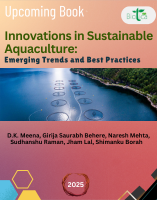 |
2025-02-25 17:06:43 |
Edit |
Delete |
| 5 |
|
|
Online Book |
Cutting-Edge Research in Sericulture: Enhancing Productivity and Quality |
N. Sakthivel, Ramakrishna Naika, B. Sannappa, P. Kumaresan, L. Muthulakshmi, P. Priyadharshini |
750 |
978-81-980121-6-6 |
About the Book
The book delves into the latest advancements in sericulture, emphasizing innovative methods to boost both the yield and quality of silk production. This comprehensive volume explores genetic improvements in silkworms, including the development of transgenic strains that exhibit enhanced disease resistance and superior silk properties. The book also highlights advancements in mulberry cultivation, such as the introduction of high-yield, pest-resistant varieties and optimized agronomic practices. Biotechnology plays a pivotal role, with breakthroughs in molecular markers and genomic tools aiding in the selection and breeding of silkworms and mulberry plants. Additionally, the integration of modern technologies like IoT and AI in sericulture management is discussed, showcasing their potential in monitoring and optimizing environmental conditions, thus ensuring optimal growth and productivity. The compilation of recent research underscores the importance of sustainable practices and the use of organic methods to improve the quality of silk while minimizing environmental impact. By bringing together contributions from leading scientists and experts in the field, the book serves as a vital resource for researchers, practitioners, and policymakers aiming to enhance the efficiency and sustainability of sericulture.
|
|
|
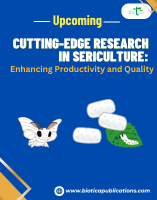 |
2025-02-15 06:40:17 |
Edit |
Delete |
| 6 |
|
|
Online Book |
Progress and Prospects in Cereal Crops Research |
Raihana Habib Kanth, Monika Ray, Joy Kumar Dey, Prajjal Dey, Ardhendu Chakraborty |
1250 |
978-81-980121-7-3 |
About the Book
It offers a comprehensive examination of recent advancements and future directions in cereal crop science, emphasizing climate resilience, genomics, precision farming, RNA interference (RNAi), policy frameworks, soil and nutrient health, and biotic and abiotic stress management. The book highlights the integration of next generation sequencing and genome editing technologies, such as CRISPR, to accelerate breeding programs and develop stress-tolerant varieties. It explores precision farming techniques to optimize inputs and enhance productivity, as well as RNAi applications for pest and disease resistance. Additionally, the book addresses sustainable soil and nutrient management practices and the importance of supportive policy frameworks in promoting agricultural innovation. By bridging scientific research with practical applications, this volume serves as a vital resource for advancing cereal crop production and ensuring global food security.
|
|
|
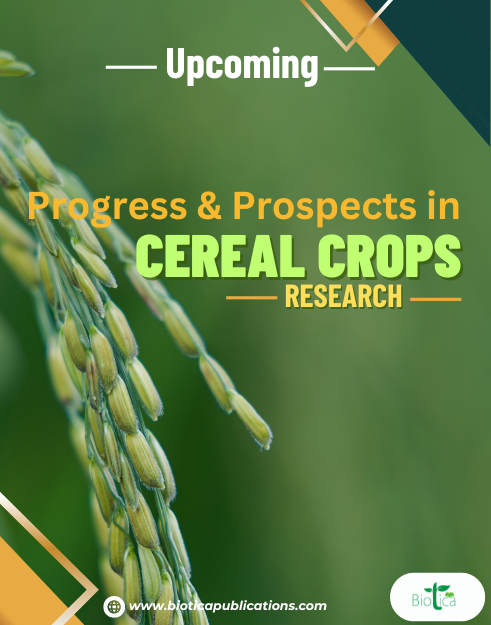 |
2025-02-15 06:41:21 |
Edit |
Delete |
| 7 |
|
|
Online Book |
Aquaculture Reimagined: Modern Approaches to Sustainable Fish Farming |
Editors: V.P. Saini, Tapas Paul, Ashutosh Kumar Singh, Abhilipsa Biswal and Rupam Samanta |
1250 |
978-81-980121-3-5 |
Cover Page: Download
Content Page: Download
ISBN: 978-81-980121-3-5
DOI: https://doi.org/10.54083/978-81-980121-3-5
About the Book:
The book is a comprehensive exploration of contemporary strategies and innovations aimed at revolutionizing the aquaculture industry with a focus on environmental and economic sustainability. This book delves into cutting-edge practices such as alternative protein sources, including black soldier fly larvae, and waste conversion technologies for sustainable feed management. It covers the use of prebiotics, Aloe vera, and plant extracts to enhance fish health and growth, alongside regional insights into diverse aquaculture practices. The text also investigates microbial-based systems, the application of ferulic acid, and the substitution of fish oil with palm oil. Addressing critical aspects of water quality management, climate-smart practices, and the economic and environmental impacts of integrated multi-trophic aquaculture (IMTA), the book highlights genetic improvements, biotechnology, and community-based approaches to sustainable practices. Through detailed case studies and real-world applications, it provides valuable insights into the successful implementation of innovative techniques. The objective of this book is to bridge the gap between traditional aquaculture and modern sustainable approaches, equipping researchers, practitioners and policymakers with the knowledge and tools needed to enhance fish farming operations. For scholars, it serves as an essential reference, offering in-depth analysis, comprehensive coverage of recent advancements, and practical applications that support the development of innovative solutions for the future of the aquaculture industry.
Published 2025
Copyright © 2025 Reserved with the Editor(s) under exclusive license to BIOTICA
Published by: Biotica Publications (India)
Printed by: Biotica Publications
How to Cite the Book?
Saini, V.P., Paul, T., Singh, A.K., Biswal, A., Samanta, R., 2025. Aquaculture Reimagined: Modern Approaches to Sustainable Fish Farming. Biotica Publications, India. p. 299. DOI: https://doi.org/10.54083/978-81-980121-3-5.
|
Chief Editor
Dr. V.P. Saini
Dean
College of Fisheries, Kishanganj, Bihar Animal Sciences University, Bihar (855 115), India
email: sainivpfish@yahoo.com
Associate Editor
Mr. Tapas Paul
Assistant Professor
Department of Aquatic Environment Management,
College of Fisheries, Kishanganj,
Bihar Animal Sciences University, Bihar (855 115), India
Mr. Ashutosh Kumar Singh
Assistant Professor
Department of Aquatic Environment Management,
College of Fisheries, Kishanganj,
Bihar Animal Sciences University, Bihar (855 115), India
Ms. Abhilipsa Biswal
Subject Matter Specialist (Animal Science-Fisheries)
Krishi Vigyan Kendra, Lada,
Dr. Rajendra Prasad Central Agricultural University, Pusa, Samastipur, Bihar (848 125), India
Dr. Rupam Samanta
Assistant Professor
Department of Fisheries Resource Management,
College of Fisheries, Kishanganj,
Bihar Animal Sciences University, Bihar (855 115), India
|
|
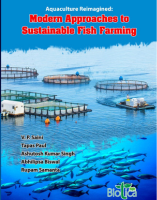 |
2025-09-25 03:02:12 |
Edit |
Delete |
| 8 |
|
|
Upcoming Book |
ID 16 Field Crops Production & Management |
Kharif & Rabi |
Coming soon |
Coming soon |
Background
This is a comprehensive resource designed for scientists, researchers, students and farmers. This book presents the latest innovations, technologies and best practices in the cultivation and management of major field crops. It covers improved production techniques, soil fertility management, precision farming, climate-resilient strategies and integrated pest and disease management. Emphasizing a holistic approach, it integrates traditional knowledge with modern scientific advancements to optimize crop yield and quality. The book also provides insights into government policies, organic farming and post-harvest management. By bridging the gap between research and practical application, this book serves as a valuable guide for academia and practitioners alike, promoting sustainable agricultural development.
Each chapters must have the following contents elaborately
- Introduction/Origin
- Varieties
- Soil and climate
- Season of planting
- Planting material
- Field preparation
- Planting
- Spacing
- Irrigation
- Intercropping
- Manures and fertilizers
- Interculture operation
- Plant Protection
etc.
**Authors are free to include more information
CHAPTER SUBMISSION PROCEDURE:
Book Chapter may be submitted through e-mail: bioticabooks@gmail.com
FOR ANY QUERIES:
Contact:+91-9863023086
Mail us: bioticabooks@gmail.com
Authors' Guidelines Publication Package
|
|
IMPORTANT DATES:
- Chapter booking ends: 25th April, 2025
- Chapter submission ends: 25th May, 2025
CHAPTER SUBMISSION PROCEDURE:
Book Chapter may be submitted through e-mail: bioticabooks@gmail.com
FOR ANY QUERIES:
Contact:+91-9863023086
Mail us: bioticabooks@gmail.com
Authors' Guidelines Publication Package
|
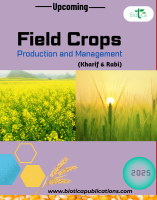 |
2025-03-29 09:14:17 |
Edit |
Delete |
| 9 |
|
|
Upcoming Book |
ID 15 Modern Poultry Science: Integrating Genetics, Nutrition and Management |
Open Access |
Coming soon |
Coming soon |
Background
The book provides a comprehensive overview of contemporary poultry production, covering key areas such as the evolution and improvement of poultry breeds, advances in genomic selection and gene editing, and the role of epigenetics. It examines nutritional requirements, innovative feed formulations, and the use of prebiotics and probiotics. The book also addresses best practices in housing, biosecurity and welfare standards, alongside strategies for disease prevention and control. Market challenges, including economic issues, global trade impacts, consumer preferences and sustainability, are critically analyzed. Current research topics like poultry immunology, climate change effects, microbiome research and reducing antibiotic use are explored. Integrative themes highlight the synergy between genetics and nutrition, genotype-environment interactions and precision farming. With case studies and practical applications, the book offers valuable insights for researchers, industry professionals and students, addressing both scientific advancements and practical challenges in poultry science.
Tentative Titles/Themes of Chapter (New chapter titles may be proposed)
Theme 1: Diversity and Evolution of Poultry Breeds
Theme 2: Heritage Breeds in Modern Poultry Production
Theme 3: Genetic Improvement of Commercial Poultry Breeds
Theme 4: Hybrid Poultry: Advantages and Challenges
Theme 5: Emerging Breeds for Sustainable Poultry Production
Theme 6: Genomic Selection in Poultry: Techniques and Applications
Theme 7: CRISPR and Gene Editing in Poultry
Theme 8: Epigenetics and Its Role in Poultry Development
Theme 9: Genetic Markers for Disease Resistance in Poultry
Theme 10: Breeding for Behavioral Traits in Poultry
Theme 11: Advances in Poultry Nutrition: From Feed to Food
Theme 12: Nutritional Requirements for Different Poultry Species
Theme 13: Feed Formulation and Optimization for Poultry
Theme 14: Role of Prebiotics and Probiotics in Poultry Nutrition
Theme 15: Nutritional Strategies to Enhance Poultry Product Quality
Theme 16: Best Practices in Poultry Housing and Environment
Theme 17: Biosecurity Measures in Poultry Farming
Theme 18: Automation and Precision Farming in Poultry Management
Theme 19: Welfare Standards and Ethical Considerations in Poultry Management
Theme 20: Optimizing Reproductive Performance in Poultry
Theme 21: Common Poultry Diseases: Prevention and Control
Theme 22: Avian Influenza: Threats and Mitigation Strategies
Theme 23: Managing Bacterial and Viral Infections in Poultry
Theme 24: Parasitic Infestations in Poultry: Diagnosis and Treatment
Theme 25: Innovative Vaccination Strategies in Poultry Health Management
Theme 26: Economic Challenges in the Poultry Industry
Theme 27: Impact of Global Trade on Poultry Markets
Theme 28: Consumer Preferences and Trends in Poultry Products
Theme 29: Regulatory and Policy Issues Affecting Poultry Production
Theme 30: Sustainability and Environmental Impact of Poultry Farming
Theme 31: Emerging Research in Poultry Immunology
Theme 32: Novel Feed Ingredients and Their Impact on Poultry Health
Theme 33: Climate Change and Its Effects on Poultry Production
Theme 34: Microbiome Research in Poultry: Implications and Applications
Theme 35: Innovative Approaches to Reduce Antibiotic Use in Poultry
Theme 36: Integrating Genetics and Nutrition for Enhanced Poultry Productivity
Theme 37: Genotype-Environment Interactions in Poultry Production
Theme 38: Advances in Precision Breeding and Nutritional Management
Theme 39: Sustainable Poultry Production: Integrating Genetic and Nutritional Innovations
Theme 40: Multidisciplinary Approaches to Addressing Poultry Health Challenges
Theme 41: The Future of Poultry Breeding: Trends and Predictions
Theme 42: Innovative Feed Technologies for the Next Generation of Poultry
Theme 43: Digital and Smart Farming Technologies in Poultry Management
Theme 44: Harnessing Big Data and AI in Poultry Research
Theme 45: Future Challenges and Opportunities in Poultry Science
Theme 46: Case Studies in Genetic Improvement of Poultry Breeds
Theme 47: Real-world Applications of Advanced Nutrition Strategies in Poultry
Theme 48: Successful Management Practices from Leading Poultry Farms
Theme 49: Overcoming Disease Outbreaks: Lessons from the Field
Theme 50: Market Innovations and Success Stories in the Poultry Industry
**Note: Chapter title may be modified or new chapter may also be proposed by the author.
CHAPTER SUBMISSION PROCEDURE:
Book Chapter may be submitted through e-mail: bioticabooks@gmail.com
FOR ANY QUERIES:
Contact:+91-9863023086
Mail us: bioticabooks@gmail.com
Authors' Guidelines Publication Package
|
|
IMPORTANT DATES:
- Chapter booking ends: 25th April, 2025
- Chapter submission ends: 25th May, 2025
CHAPTER SUBMISSION PROCEDURE:
Book Chapter may be submitted through e-mail: bioticabooks@gmail.com
FOR ANY QUERIES:
Contact:+91-9863023086
Mail us: bioticabooks@gmail.com
Authors' Guidelines Publication Package
|
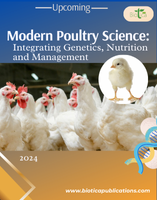 |
2025-03-26 11:42:48 |
Edit |
Delete |
| 10 |
|
|
Upcoming Book |
ID 10 Cereal Diseases: Advanced Approaches for Diagnosis and Management |
Wheat, Rice, Maize, Rye, Oats, Barley, Millets |
Coming soon |
Coming soon |
Background
It offers a comprehensive exploration of contemporary strategies to tackle viral, bacterial and fungal diseases affecting major cereal crops. The book delves into the latest advancements in diagnostics, including genomic technologies and nanotechnology applications, providing precise and rapid identification of pathogens. It emphasizes breeding approaches and potential strategies for developing disease-resistant varieties through genomic insights and molecular techniques. Integrated Disease Management (IDM) principles are thoroughly examined, highlighting the synergy of cultural, biological, chemical and genetic methods for sustainable disease control. This book serves as an essential resource for researchers and students, aiming to enhance cereal crop health and productivity through innovative and integrated management practices.
Tentative Titles/Themes of Chapter (New chapter titles may be proposed)
Theme A: Bacterial Diseases
-
Revolutionizing Bacterial Disease Detection in Cereals with Genomics
-
Microbial Antagonists: Nature’s Answer to Bacterial Diseases in Cereals
-
Harnessing Plant Immunity Against Bacterial Invaders in Cereals
-
Biotechnological Innovations in Bacterial Disease Resistance for Cereal Crops
-
Microbiome Engineering for Bacterial Disease Suppression in Cereals
Theme B: Viral Diseases
-
Next-Gen Sequencing for Viral Pathogen Identification in Cereals
-
Virus-Resistant Cereals: Genetic Breakthroughs and Future Directions
-
Host-Virus Interactions: Decoding the Molecular Mechanisms in Cereals
-
Viral Disease Management in Cereals Through Gene Silencing Techniques
-
Advanced Virus Epidemiology and Disease Management in Cereal Crops
Theme C: Fungal Diseases
-
Fungal Pathogenomics: Deciphering Fungal Disease Mechanisms in Cereals
-
Eco-Friendly Fungicides for Sustainable Cereal Disease Management
-
Molecular Approaches to Combat Fungal Diseases in Cereal Crops
-
Innovations in Fungal Disease Resistance Breeding for Cereals
-
Integrated Management of Fusarium caused diseases
Theme D: Etiology, Epidemiology and Management
-
Novel Insights into the Etiology of Emerging Cereal Diseases
-
Integrated Epidemiological Strategies for Sustainable Disease Control in Cereals
-
Molecular Epidemiology: Tracking Cereal Pathogens in Real-Time
-
Advanced Data Analytics for Cereal Disease Prediction and Management
-
Pathogen Surveillance Networks: A New Frontier in Cereal Disease Management
Theme E: Plant Breeding and Diseases Management
-
Accelerated Breeding Techniques for Disease-Resistant Cereals
-
Integrative Genomic Approaches in Cereal Disease Breeding Programs
-
CRISPR/Cas9: A Paradigm Shift in Cereal Disease Resistance Breeding
-
Omics-Based Strategies for Breeding Disease-Resistant Cereal Varieties
-
Genomic Tools for Enhancing Disease Resistance in Cereal Crops
Theme F: Identification of a New Susceptibility Gene
-
Genome Editing to Eliminate Susceptibility Genes in Cereals
-
Functional Genomics Approaches to Identify Susceptibility Genes in Cereals
-
Deciphering the Role of Susceptibility Genes in Cereal Pathogenesis
-
Susceptibility Gene Knockout for Enhanced Disease Resistance in Cereals
-
Novel Susceptibility Genes and Their Implications in Cereal Breeding
Theme G: Breeding Strategies for Developing Disease-Resistant Varieties
-
Cutting-Edge Techniques for Developing Disease-Resistant Cereals
-
Exploring Genetic Diversity for Disease Resistance in Cereal Crops
-
Biotechnological Innovations in Cereal Disease Resistance Breeding
-
Advanced Marker-Assisted Breeding for Disease Resistance in Cereals
-
Innovative Cross-Breeding Techniques for Cereal Disease Resistance
Theme H: Potential Breeding Strategies for Developing Disease-Resistant Varieties
-
Exploring Epigenetic Modifications for Cereal Disease Resistance
-
Integrating Multi-Omics for Robust Disease Resistance in Cereals
-
Precision Breeding: The Future of Disease Resistance in Cereals
-
Leveraging Synthetic Biology for Enhanced Disease Resistance in Cereals
-
Harnessing Plant-Pathogen Coevolution for Cereal Disease Resistance
Theme I: Economic and Eco-Friendly Alternatives for Efficient and Safe Management
-
Economic Analysis of Integrated Disease Management in Cereals
-
Biological Control Agents: Cost-Effective Solutions for Cereal Diseases
-
Green Chemistry in Cereal Disease Management: Innovations and Impact
-
Sustainable Disease Management Practices for High-Yield Cereal Production
-
Economic Benefits of Eco-Friendly Disease Management in Cereal Crops
Theme J: Resistance Gene Identification, Cloning and Characterization
-
Novel Approaches for the Identification of Resistance Genes in Cereals
-
Cloning and Functional Characterization of Novel Resistance Genes
-
Genomic Insights into Resistance Gene Evolution in Cereal Crops
-
Leveraging Biotechnology for Resistance Gene Characterization in Cereals
-
High-Throughput Screening of Resistance Genes in Cereal Genomes
Theme K: Utilization of Biosensors in the Identification of Bacterial Diseases
-
Nanotechnology-Enhanced Biosensors for Cereal Pathogen Detection
-
Smart Biosensors: Revolutionizing Disease Diagnostics in Cereal Agriculture
-
Real-Time Monitoring of Cereal Diseases Using Advanced Biosensors
-
Field-Ready Biosensors for On-Site Cereal Disease Detection
-
Integrative Biosensing Technologies for Precision Disease Management in Cereals
Theme L: Nanomaterials for Integrated Crop Disease Management
-
Nanoparticle-Based Solutions for Cereal Disease Control
-
Harnessing Nano-Fungicides for Sustainable Cereal Disease Management
-
Nanotechnology Applications in the Reduction of Mycotoxins in Cereals
-
Nano-Biotechnological Approaches for Cereal Disease Diagnosis
-
Eco-Friendly Nanomaterials for Cereal Disease Management
Theme M: Metallic Nanoparticles and Nano-Based Bioactive Formulations as Nano-Fungicides
-
Innovative Nano-Fungicides for Fungal Disease Control in Cereals
-
Metallic Nanoparticles: A New Frontier in Cereal Disease Management
-
Synthesis and Application of Nano-Based Bioactive Formulations in Cereal Protection
-
Environmental Impact and Safety of Nano-Fungicides in Cereal Farming
-
Integration of Nano-Fungicides in Cereal Disease Management Practices
Theme N: Applications of Nano-Biotechnological Approaches in Diagnosis and Protection of Diseases
-
Advanced Nano-Biotechnological Techniques for Cereal Disease Diagnostics
-
Nanotechnology-Enhanced Disease Resistance in Cereal Crops
-
Innovative Nano-Biosensors for Pathogen Detection in Cereals
-
Nano-Biotechnological Solutions for Sustainable Cereal Farming
-
Future Prospects of Nanotechnology in Cereal Disease Management
Theme O: Integrated Disease Management
-
Comprehensive Strategies for Integrated Disease Management in Cereals
-
Synergistic Approaches in IDM for Sustainable Cereal Protection
-
Role of Biological Control in Integrated Disease Management of Cereals
-
Implementing IDM for Improved Cereal Yield and Quality
-
Innovative Technologies for Integrated Management of Cereal Diseases
Theme P: Eco-Friendly Management
-
Sustainable Approaches to Cereal Disease Management
-
Eco-Friendly Fungicides for Long-Term Cereal Protection
-
Environmental Benefits of Sustainable Cereal Disease Management
-
Organic Farming Practices for Cereal Disease Control
-
Eco-Friendly Technologies for Integrated Pest and Disease Management in Cereals
**Note: Chapter title may be modified or new chapter may also be proposed by the author.
CHAPTER SUBMISSION PROCEDURE:
Book Chapter may be submitted through e-mail: bioticabooks@gmail.com
FOR ANY QUERIES:
Contact:+91-9863023086
Mail us: bioticabooks@gmail.com
Authors' Guidelines Publication Package
|
|
IMPORTANT DATES:
- Chapter booking ends: 25th April, 2025
- Chapter submission ends: 25th May, 2025
CHAPTER SUBMISSION PROCEDURE:
Book Chapter may be submitted through e-mail: bioticabooks@gmail.com
FOR ANY QUERIES:
Contact:+91-9863023086
Mail us: bioticabooks@gmail.com
Authors' Guidelines Publication Package
|
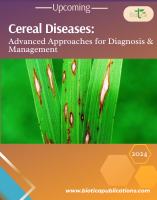 |
2025-03-26 11:31:03 |
Edit |
Delete |
| 11 |
|
|
Upcoming Book |
ID 11 Integrative Mulberry Research: Genetics, Cultivation and Economic Potential |
Open Access |
Coming soon |
Coming soon |
Background
It delves into the multifaceted world of mulberry cultivation, spotlighting its genetic diversity, advanced breeding techniques and biotechnology applications. This comprehensive guide explores the development of high-yielding varieties (HYV) through modern breeding methods aimed at enhancing both quality and productivity. The book addresses critical challenges such as biotic and abiotic stresses, offering insights into innovative solutions for disease resistance and environmental resilience. It highlights the economic significance of mulberry as a cornerstone of sericulture, emphasizing its potential in the global market. Readers will gain a thorough understanding of the genetic underpinnings of mulberry, advanced cultivation practices and the latest advancements in biotechnology that promise to revolutionize the industry. This essential resource provides valuable knowledge for researchers, agronomists and entrepreneurs, paving the way for sustainable growth and economic development in mulberry cultivation. Through detailed chapters and cutting-edge research, the book serves as a vital reference for those aiming to harness the full potential of mulberry, ensuring its role in the future of agricultural innovation and economic prosperity.
Chief Editor
Dr. Ramakrishna Naika
Professor and Head
Department of Crop Protection & Sericulture
College of Sericulture
Chintamani -563 125, Karnataka
Tentative Titles/Themes of Chapter (New chapter titles may be proposed)
Theme 1: Introduction to Mulberry: History and Significance
Theme 2: Botany of Mulberry: Morphology and Taxonomy
Theme 3: Ecological and Ecophysiological Aspects of Mulberry
Theme 4: Mycorrhizal Interactions in Mulberry
Theme 5: Mulberry Development in Relation to Other Organisms
Theme 6: Molecular Aspects of Mulberry: RAPD Analysis
Theme 7: SSR Markers in Mulberry Research
Theme 8: Cytological Studies in Mulberry: Techniques and Findings
Theme 9: Genome Sequencing in Mulberry: Current Status
Theme 10: Propagation Techniques for Mulberry: Traditional and Modern Methods
Theme 11: Mulberry Production: Best Practices and Innovations
Theme 12: Phytochemical Constituents of Mulberry: An Overview
Theme 13: Pharmacological Activities of Mulberry: Recent Findings
Theme 14: Human Health Benefits of Mulberry Consumption
Theme 15: Economic Importance of Mulberry: A Global Perspective
Theme 16: Traditional Medical Uses of Mulberry
Theme 17: Global Perspectives on Mulberry Cultivation
Theme 18: Future Approaches in Mulberry Research and Cultivation
Theme 19: Mulberry and Biotic Stresses: Management and Mitigation
Theme 20: Abiotic Stresses in Mulberry: Challenges and Solutions
Theme 21: Botanical Features of Mulberry: An In-Depth Analysis
Theme 22: Economic Significance of Mulberry: Current Trends
Theme 23: Cultivation Practices for Mulberry: Regional Variations
Theme 24: Utilization of Mulberry: From Farm to Industry
Theme 25: Economic Benefits of Mulberry: Case Studies
Theme 26: Mulberry Breeding for Higher Leaf Productivity
Theme 27: Genome Analysis in Mulberry: Achievements and Challenges
Theme 28: Relationship Between Genome Size and Ploidy Level in Mulberry
Theme 29: Transcriptomics in Mulberry: Identifying Trait-Specific Genes
Theme 30: Proteomics in Mulberry: Techniques and Applications
Theme 31: Importance and Current Status of DUS Testing in Mulberry
Theme 32: Molecular Diagnostics of Soil-Borne Diseases in Mulberry
Theme 33: Foliar Diseases of Mulberry: Molecular Approaches
Theme 34: Transgenic Mulberry for Stress Tolerance: Progress and Prospects
Theme 35: Application of Mulberry By-Products in Medicine
Theme 36: Medical Uses of Mulberry Silkworm By-Products
Theme 37: Green Synthesized Nanoparticles in Mulberry Production
Theme 38: Sustainable Mulberry Production: Trends and Opportunities
Theme 39: Future Perspectives in Mulberry Genomic Research
Theme 40: Packaging and Practices in Mulberry Cultivation
Theme 41: New Promising Varieties of Mulberry
Theme 42: Pest Management in Mulberry Cultivation
Theme 43: Diseases of Mulberry Plants: Identification and Control
Theme 44: Ecophysiology of Mulberry: Water and Nutrient Use Efficiency
Theme 45: Integrative Approaches to Mulberry Breeding
Theme 46: Technological Advances in Mulberry Propagation
Theme 47: Mulberry Cultivation in Marginal Lands: Potential and Practices
Theme 48: Climate Change and Its Impact on Mulberry Cultivation
Theme 49: Genetic Diversity in Mulberry: Conservation and Utilization
Theme 50: Policy and Regulatory Frameworks for Mulberry Cultivation
**Note: Chapter title may be modified or new chapter may also be proposed by the author.
CHAPTER SUBMISSION PROCEDURE:
Book Chapter may be submitted through e-mail: bioticabooks@gmail.com
FOR ANY QUERIES:
Contact:+91-9863023086
Mail us: bioticabooks@gmail.com
Authors' Guidelines Publication Package
|
|
IMPORTANT DATES:
-
Chapter booking ends: 25th April, 2025
-
Chapter submission ends: 25th May, 2025
CHAPTER SUBMISSION PROCEDURE:
Book Chapter may be submitted through e-mail: bioticabooks@gmail.com
FOR ANY QUERIES:
Contact:+91-9863023086
Mail us: bioticabooks@gmail.com
Authors' Guidelines Publication Package
|
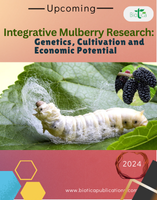 |
2025-03-26 10:02:07 |
Edit |
Delete |
| 12 |
|
|
Upcoming Book |
ID 12 Next-Generation Smart Farming: AI Applications and Technological Advancements |
Open Access |
Coming soon |
Coming soon |
Background
The book delves into the transformative potential of advanced technologies in modern agriculture, focusing on precision farming, artificial intelligence (AI), drones and smart farming systems. The book explores how AI-driven analytics and machine learning models are revolutionizing decision-making processes, enabling farmers to optimize crop yields and resource use. It examines the integration of big data analytics to analyze vast amounts of agricultural data, providing actionable insights for better farm management. The role of drones in monitoring crop health, assessing field conditions and applying treatments with pinpoint accuracy is thoroughly discussed, highlighting their contribution to enhanced productivity and sustainability. The book also addresses the implementation of Internet of Things (IoT) devices in agriculture, which facilitate real-time monitoring and control of various farming operations, from soil moisture levels to livestock health. Innovative irrigation management techniques enabled by smart sensors and AI algorithms are presented, showcasing their impact on water conservation and efficient use of resources. Emphasizing climate resilience, the book explores strategies to adapt farming practices to changing climatic conditions through predictive analytics and smart technologies. Additionally, it covers the integration of AI and IoT for comprehensive crop health monitoring, allowing early detection of diseases and pests and timely interventions. By combining theoretical insights with practical applications, "Next-Generation Smart Farming" serves as an essential resource for researchers, practitioners and policymakers aiming to harness the power of technology to drive the future of sustainable and resilient agriculture.
Tentative Titles/Themes of Chapter (New chapter titles may be proposed)
Chapter 1: Transforming Agriculture with AI: An Introduction
Chapter 2: Innovative Farming Practices for the 21st Century
Chapter 3: Recent Breakthroughs in Smart Agriculture Technologies
Chapter 4: Harnessing AI for Sustainable Agricultural Development
Chapter 5: Precision Farming: Remote Sensing Techniques and Tools
Chapter 6: Geospatial Technologies: Mapping the Future of Agriculture
Chapter 7: Water Management Revolution: AI and Remote Sensing Synergy
Chapter 8: Advanced Strategies for Intensified Agriculture
Chapter 9: Predicting Crop Yields: AI and Machine Learning Approaches
Chapter 10: Remote Sensing Innovations for Smart Farming
Chapter 11: Agricultural Technology Disruption: AI's Role
Chapter 12: Building Climate-Resilient Agricultural Systems
Chapter 13: Big Data in Agriculture: Enhancing Weather Forecast Accuracy
Chapter 14: Smart Crop Monitoring Systems: Integrating AI and IoT
Chapter 15: Internet of Things in Agriculture: A New Era of Farming
Chapter 16: Optimizing Soil Moisture and Temperature with AI Solutions
Chapter 17: UAVs in Agriculture: Precision from Above
Chapter 18: Innovative Smart Irrigation Techniques for Water Efficiency
Chapter 19: Managing Biotic Stresses in Crops with Smart Technologies
Chapter 20: Soilless Cultivation: AI-Powered Techniques and Benefits
Chapter 21: Nutrient Management with Smart Farming Technologies
Chapter 22: AI and IoT Integration in Modern Soilless Farming
Chapter 23: Early Detection of Plant Diseases with AI Technologies
Chapter 24: Pest Control Innovations: AI-Driven Solutions
Chapter 25: Deep Learning for Leaf Disease Detection in Crops
Chapter 26: Automation in Agriculture: Robotic Seeding and Sowing
Chapter 27: Advanced AI Techniques for Accurate Crop Yield Prediction
Chapter 28: Overcoming AI Challenges in Modern Agriculture
Chapter 29: Boosting Efficiency in Precision Farming with AI
Chapter 30: Predictive Models for Smart Agricultural Practices
Chapter 31: AI-Based Decision Support for Farmers: A Game Changer
Chapter 32: Geospatial Analysis for Enhanced Crop Health Monitoring
Chapter 33: Innovations in Soil Health Assessment with Remote Sensing
Chapter 34: Adapting to Climate Change with Smart Farming Technologies
Chapter 35: AI-Powered Weather Predictions for Better Farming Decisions
Chapter 36: IoT-Enabled Crop Management Systems: Real-Time Solutions
Chapter 37: Sensor Innovations for Accurate Agricultural Data Collection
Chapter 38: The Future of Drones in Precision Agriculture
Chapter 39: Managing Smart Greenhouses with AI and IoT Technologies
Chapter 40: Blockchain in Agriculture: Ensuring Transparency and Traceability
Chapter 41: Ethical Implications of AI in Agriculture
Chapter 42: Future Directions in AI-Driven Agricultural Innovations
Chapter 43: Enhancing Farm Productivity with Advanced AI Tools
Chapter 44: Geospatial Data Integration in Precision Agriculture
Chapter 45: AI-Driven Soil Fertility Management
Chapter 46: Leveraging Big Data for Climate-Resilient Farming
Chapter 47: Predictive Analytics in Smart Agriculture
Chapter 48: IoT and AI for Enhanced Crop Quality and Yield
Chapter 49: Sustainable Farming Practices with AI Innovations
Chapter 50: Redefining Agricultural Practices with Next-Gen Smart Technologies
**Note: Chapter title may be modified or new chapter may also be proposed by the author.
CHAPTER SUBMISSION PROCEDURE:
Book Chapter may be submitted through e-mail: bioticabooks@gmail.com
FOR ANY QUERIES:
Contact:+91-9863023086
Mail us: bioticabooks@gmail.com
Authors' Guidelines Publication Package
|
|
IMPORTANT DATES:
- Chapter booking ends: 25th April, 2025
- Chapter submission ends: 25th May, 2025
CHAPTER SUBMISSION PROCEDURE:
Book Chapter may be submitted through e-mail: bioticabooks@gmail.com
FOR ANY QUERIES:
Contact:+91-9863023086
Mail us: bioticabooks@gmail.com
Authors' Guidelines Publication Package
|
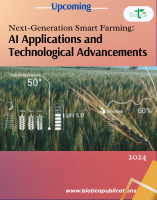 |
2025-03-26 09:55:00 |
Edit |
Delete |
| 13 |
|
|
Online Book |
Enhancing Crop Resilience: Advances in Climate Smart Crop Production Technologies |
Anjani Kumar, Rameswar Prasad Sah, Basana Gowda, G., Joy Kumar Dey, Ashim Debnath, Bimal Das (Editor) |
1550 |
978-81-947739-1-7 |
DOI: https://doi.org/10.54083/978-81-947739-1-7-1
Cover Page & Content
Aim and Scope of the Book
This book aims to comprehensively explore cutting-edge climate-smart technologies that contribute to the advancement of sustainable agriculture. Focusing on enhancing crop performance, the book aims to equip readers with in-depth knowledge and practical insights into the latest innovations, methodologies, and strategies for cultivating resilience in the face of a changing climate.
The scope of this book extends across a rich landscape of topics, providing readers with a comprehensive understanding of the multifaceted world of climate-smart agriculture. Encompassing diverse cutting-edge technologies, the book delves into precision agriculture, digital farming, climate smart varieties, and innovative irrigation and crop management systems. Beyond technology, it explores resilience-building strategies, such as climate adaptive breeding and integrated pest management, offering practical insights for improving crop performance in dynamic environmental conditions.
The scope also embraces sustainable practices, including organic farming, agroforestry, and regenerative agriculture, underscoring the interconnectedness of environmental stewardship and resilient crop production. Through real-world case studies and interdisciplinary perspectives, the book navigates the complexities of sustainable agriculture, addressing the role of policies, frameworks, and successful implementation strategies. As a forward-looking resource, it explores emerging trends and future directions, encouraging readers to envision the evolving landscape of sustainable crop production in the context of a changing climate.
|
Dr. Anjani Kumar
Dr. Anjani Kumar, an IIT Kharagpur alumnus, first time established relationship between soil water potential as measured by tensiometer and greenhouse gas emission (GHG) emission under rice ecology in Eastern India to estimate net global warming potential. Predictive models based on path modelling approach developed by him clarifies the effect of varying atmospheric CO2 levels on nitrous oxide emission from rice fields. For enhancing water productivity in rice cultivation under water limited condition, he has developed Customised Color Coded Tensiometer, NRRI- Aerobic Rice Moisture Sensor and Eco-friendly Irrigation Alert System. As a team member, he was actively engaged in developing customized leaf color chart for real time nitrogen management, climate smart resource conservation technologies, urea briquette applicator, a visual diagnostic kit for identification of nutrient disorders and mobile based apps like “riceXpert” and “CsaXpert” for better diagnosis of biotic and abiotic stress in rice. He has been conferred with IPNI Award 2013 and Nanaji Deshmukh ICAR Award for Outstanding Interdisciplinary Team research in Agriculture and Allied Sciences 2020 for his work on eco-friendly integrated nutrient management technologies in rice-based cropping systems.
Dr. Rameswar Prasad Sah
Dr. Rameswar Prasad Sah is currently serving as a Senior Scientist in the Crop Improvement Division at the ICAR-National Rice Research Institute located in Cuttack, Odisha, India. With expertise in Molecular Plant Breeding, Direct Seeded Rice (DSR) and breeding for Low Starch quality. Dr. Sah holds a Ph.D. in Genetics and Plant Breeding. In his current role, he focuses on the development of direct-seeded rice varieties, low phytate lines, low glycemic index lines. Employing advanced molecular breeding methods such as Marker-Assisted Selection (MAS) and Genome-Wide Association Studies (GWAS), he endeavors to enhance seed quality traits in rice varieties. Before joining ICAR-NRRI, Dr. Sah worked as a Scientist at the ICAR-Indian Grasslands and Fodder Research Institute in Jhansi from 2011 to 2016. During this tenure, he dedicated his efforts to improving maize varieties for tolerance to drought and waterlogging through pre-breeding approaches. Dr. Sah has made significant contributions to scientific literature with more than 60 research papers, 5 review papers, 12 popular articles, and 10 book chapters to his credit. In recognition of his outstanding contributions, Dr. Sah has been honored with several awards, including the Best Teamwork Award from the TD team in 2016, the SASSA Best Ph.D. thesis award-2015, and RMSI Best Scientist Award-2016.
Dr. Basana Gowda, G.
Dr. Basana Gowda, G., has made significant contributions to the development of IPM strategies, particularly through the use of biological control and chemical control, and has exploited their interoperability to control insect pests of rice. Biological agents, such as parasitoids and predators, are frequently taken for granted, and processes fail as a result of the poor quality bioagents. Dr. Gowda has standardized three significant quality-assured biocontrol agents for lepidopteran insect pests viz., NRRI Trichocard (T.j), NRRI Trichocard (T.c), and NRRI Braconcard (B.h). The fast and consistent provision of high-quality bioagents to various stakeholders in more than 10 Indian states led to revenue for his institute of Rs. 9.00 lakhs. Biological agents like parasitoids and predators are often taken for granted, system fails because of their poor quality. Dr. Gowda demonstrated how the laboratory mass-rearing of parasitoids on a factitious host would influences their performance on natural hosts. In his efforts to create cost-effective production protocols for mass rearing biocontrol agents, Dr. Gowda has achieved a significant milestone by securing an Indian patent 9 for his innovative invention, the "Efficient Portable Insect Collector with Automated Counter" (Patent number: 480911), showing his commitment. Dr. Gowda’s contribution to the field of plant resistance to insect pests is also noteworthy. He has phenotyped several rice accessions to the gall midge resistance and identified several resistant genotypes with their morphological, biochemical and molecular mechanisms known. He has also contributed to the development of the rice variety CR Dhan 410 (Mahamani). Dr. Gowda has also contributed in the area of farmer intention studies, pesticide budgeting and other pest management strategies. He has Secured external research grant of nearly Rs. ~5.00 crores as principal investigator (PI) from different funding agencies. Developed a mobile application ‘RiceXpert’, three databases, deposited an insect strain in national repository, he is also DGCA certified remote pilot for flying drones. Authored >60 peer-reviewed publications (citations-880; h index-15; i10index-21), edited 2 books, 16 book chapters and several popular articles and technical bulletins. Total impact factor of publications: 155.84. He has received several awards.
Dr. Joy Kumar Dey
Dr. Joy Kumar Dey is currently working as a Subject Matter Specialist (Agronomy) at Krishi Vigyan Kendra-Sepahijala, Latiacherra, Tripura under Central Agricultural University (Imphal), Manipur. He received his B.Sc. (Ag.) degree in 2014 from School of Agricultural Sciences, Medziphema, Nagaland under Nagaland University and M.Sc. (Agronomy) degree in 2016 from College of Post-Graduate Studies in Agricultural Sciences, Barapani, Megalaya under Central Agricultural University (Imphal), Manipur and Ph. D (Agronomy) degree in 2021 from Institute of Agriculture, Sriniketan, West Bengal under Visva-Bharati University, West Bengal. He also qualified National Eligibility Test (ASRB, ICAR) during 2017. He is well known for his work on Cropping System, water and nutrient management. He has published many research papers, popular article and technical articles in many renowned national and international journals. He also has experienced of handling many research projects funded various government organizations.
Dr. Ashim Debnath
Dr. Ashim Debnath currently holds the position of Assistant Professor and Head of Department (acting) in the Department of Genetics and Plant Breeding within the Faculty of Agricultural Sciences at Rajiv Gandhi University (A Central University). Previously, he served as an Assistant Professor in Genetics and Plant Breeding at the School of Agricultural Sciences, Lovely Professional University, Phagwara, Punjab. Additionally, he contributed as a Guest Faculty at both Acharya Narendra Deva University of Agriculture and Technology in Kumarganj, Ayodhya, U.P, and Nagaland University in the Department of Genetics and Plant Breeding, School of Agricultural Sciences. His academic journey includes the completion of M.Sc. and PhD degrees in Genetics and Plant Breeding from the College of Post Graduate Studies in Agricultural Sciences, Central Agricultural University, Meghalaya. Furthermore, he holds qualification in ICAR-NET in Genetics and Plant Breeding. His M.Sc. research focused on Genetic Analysis of Yield Contributing Traits in Lowland Rice Genotypes and NILs under Acidic Soil, while his doctoral research delved into Genetic analysis of leaf and neck blast resistance in rice. Dr. Debnath has been actively involved in Teaching, Research, and Extension activities. His scholarly contributions include 20 research papers, 15 research abstracts and 7 book chapters. He is also a life member of 5 professional societies and serves as a reviewer for 3 internationally and nationally reputed journals. In recognition of his significant contributions, Dr. Debnath was honored with the Young Fellow Award-2023 for his outstanding work in the field of Genetics and Plant Breeding. His research interests span across hydroponics screening, molecular breeding and screening for aluminium and iron toxicity.
Dr. Bimal Das
Dr. Bimal Das currently working as Assistant Professor in the Department of Genetics and Plant Breeding, College of Agriculture, Uttar Banga Krishi Viswavidyalaya. He has completed his M.Sc. and PhD studies in Plant Breeding at the Bidhan Chandra Krishi Viswavidyalaya, West Bengal. Also qualified National Eligibility Test (ASRB, ICAR) in Genetics and Plant Breeding. Dr. B. Das has been actively involved in Teaching, Research and Extension activities. He has published 30 research papers, 25 research abstracts and 5 book chapters. He also acts as a reviewer for five internationally renowned journals and is a life member of five professional societies. His areas of research included breeding, nanotechnology and abiotic stresses. Additionally, he has handled external funding projects related to DST&BT, ICARDA and RKVY.
|
|
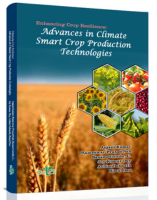 |
2024-09-04 14:18:21 |
Edit |
Delete |
| 14 |
|
|
Upcoming Book |
ID 09 Biotechnological and Molecular Approaches in the Management of Biotic Stress in Plants |
Open Access |
Coming soon |
Coming soon |
Background
This comprehensive exploration delves into the realm of biotechnology and molecular biology, showcasing innovative strategies aimed at bolstering plant resilience against pests, pathogens, and other biotic challenges. It offers a nuanced examination of advanced techniques and methodologies employed to mitigate the detrimental impacts of biotic stressors on plant species. From targeted genetic modifications to precision breeding techniques, this title illuminates the forefront of research and practical applications shaping the future of plant biotic stress management. The book will play a pivotal role in advancing knowledge, facilitating learning and fostering innovation in the fields of plant science, biotechnology and molecular biology, making it indispensable for researchers.
Tentative Titles/Themes of Chapter (New chapter titles may be proposed)
Chapter 1: Harnessing Biotechnology for Pest Control
Innovative tools to combat agricultural pests.
Chapter 2: Transgenic Triumph: Crops with Built-In Defenses
Revolutionizing insect resistance through genetic transformation.
Chapter 3: Super Enemies: Enhancing Natural Predators
Boosting the effectiveness of natural pest controllers.
Chapter 4: Next-Gen Biopesticides: Genetic Enhancement
Transforming biopesticides for superior pest management.
Chapter 5: Marker-Assisted Marvels: Precision in Pest Resistance
Selecting the best through molecular markers.
Chapter 6: Decoding Genes: Sequencing and Function Analysis
Unveiling the secrets of plant-insect interactions.
Chapter 7: Pathways to Protection: Metabolic Insights
Understanding plant metabolism for better pest resistance.
Chapter 8: Switching Defenses: Inducible Resistance Mechanisms
Activating plant defenses on demand.
Chapter 9: Molecular Diagnosis: Identifying Pests and Allies
Precision tools for identifying insect pests and natural enemies.
Chapter 10: Crafting New Weapons: Developing Insecticides
Innovative molecules for modern pest control.
Chapter 11: Sterility Solutions: Dominant Repressible Lethal Systems
Genetic strategies to produce sterile insects.
Chapter 12: Fortifying Crops: Biotechnological Resistance Enhancement
Boosting plant resilience against pests.
Chapter 13: Resistant Roots: Phenotyping for Defense
Identifying and breeding resilient plants.
Chapter 14: Gene Silence: RNAi in Pest Management
Harnessing RNA interference for targeted pest control.
Chapter 15: Fruit Fly Genomics: Insights from Tephritid Research
Exploring the genetics and distribution of fruit flies.
Chapter 16: Gut Check: Molecular Detection of Bacteria
Unraveling the gut microbiome of insects.
Chapter 17: RNAi Revolution: Future of Pest Management
Current status and future directions in RNAi research.
Chapter 18: Vector Engineering: Crafting RNAi Tools
Designing effective RNAi vectors for pest control.
Chapter 19: RNAi Readiness: Deployment Strategies
Preparing for RNAi application in the field.
Chapter 20: Signal Spread: dsRNA/siRNA Uptake Mechanisms
Understanding the journey of RNA molecules in plants and insects.
Chapter 21: Bioremediation Brilliance: Cleansing Pesticides
Using microorganisms to detoxify the environment.
Chapter 22: Microbial Allies: Pathogens in Pest Control
Harnessing microorganisms for insect management.
Chapter 23: Nematode Knights: EPNs in Action
Entomopathogenic nematodes as pest warriors.
Chapter 24: Marker Magic: Tools in Entomological Research
Advances in molecular markers for insect studies.
Chapter 25: Cotton Chronicles: Transgenics in India
The story of genetically modified cotton in India.
Chapter 26: Fruit Crop Defense: Biotech Against Pests
Biotechnological strategies for fruit crop protection.
Chapter 27: Microbial Mastery: Managing Resistance
Tackling resistance to microbial control agents.
Chapter 28: Bt Breakthroughs: Overcoming Cross Resistance
Strategies to combat resistance to Bacillus thuringiensis.
Chapter 29: Bt Strategies: Managing Resistance in the Field
Approaches to sustain the effectiveness of Bt toxins.
Chapter 30: Mosquito Wars: Bacterial Insecticides
Battling mosquito populations with bacterial tools.
Chapter 31: Mite Management: Biological and Molecular Approaches
Innovative solutions for managing mite pests.
Chapter 32: Pest Profiles: Biosystematics and Characterization
Molecular techniques for pest identification and management.
Chapter 33: Honeybee Health: Precision Diagnostics
Molecular methods for diagnosing diseases and mites in honeybees.
Chapter 34: Sustainable Shield: Biointensive Pest Management
Integrating biological controls for sustainable agriculture.
Chapter 35: Host Plant Heroes: Natural Resistance
Breeding plants with inherent pest resistance.
Chapter 36: Insecticide Insights: Molecular Resistance
Understanding the genetics behind insecticide resistance.
Chapter 37: Primed for Defense: Induced Resistance
Harnessing priming techniques for stronger plant defenses.
Chapter 38: Transgenic Triumphs: Insect-Resistant Plants
Advances in transgenic technology for pest control.
Chapter 39: Stress Shield: Molecular Approaches
Molecular strategies to manage plant stress.
Chapter 40: RNAi Tech: Cutting-Edge Pest Control
Exploring RNA interference for innovative pest management.
Chapter 41: Protease Protection: Inhibitors in Defense
Using proteinase inhibitors to protect plants.
Chapter 42: Hormone Hijinks: Analogues and Inhibitors
Manipulating insect hormones for pest control.
Chapter 43: Plant Defenders: Phyto-Antifeedants
Natural compounds deterring insect pests.
Chapter 44: Chemical Communication: Chemoecology
Understanding plant-insect chemical interactions.
Chapter 45: Bioinformatics Brilliance: Data-Driven Decisions
Leveraging bioinformatics for pest management.
Chapter 46: Nano Innovations: Tiny Tools for Big Problems
Nanotechnology in the fight against pests.
Chapter 47: Ethical Excellence: Safety in Biotech
Balancing innovation with ethical considerations.
CHAPTER SUBMISSION PROCEDURE:
Book Chapter may be submitted through e-mail: bioticabooks@gmail.com
FOR ANY QUERIES:
Contact:+91-9863023086
Mail us: bioticabooks@gmail.com
Authors' Guidelines Publication Package
|
|
IMPORTANT DATES:
- Chapter booking ends: 25th April, 2025
- Chapter submission ends: 25th May, 2025
CHAPTER SUBMISSION PROCEDURE:
Book Chapter may be submitted through e-mail: bioticabooks@gmail.com
FOR ANY QUERIES:
Contact:+91-9863023086
Mail us: bioticabooks@gmail.com
Authors' Guidelines Publication Package
|
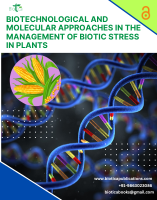 |
2025-03-26 09:51:42 |
Edit |
Delete |
| 15 |
|
|
Upcoming Book |
ID 07 Integrated Pest Management: Advancement, Adoption and Ecological Challenges |
Upcoming |
Coming soon |
Coming soon |
Background
This book offers a comprehensive assessment of the strategies utilized in ecologically-based pest management, delivering a well-rounded examination of methods that prioritize environmental safety and ecological integrity. It delves into various subjects, including the employment of biological control mechanisms involving fungi and viruses, the preservation of natural predator populations, the application of botanical solutions and the correlation between efficient pest management and the advancement of food security. Positioned within the broader realms of agriculture, sustainability and environmental preservation, this publication presents a diverse and globally-informed viewpoint on integrated pest management. Its insights are valuable not only to researchers specializing in entomology, crop protection, environmental sciences and pest management, but also to those with multidisciplinary interests.
Chief Editor
Dr. Mukesh Sehgal,
Principal Scientist,
ICAR-NCIPM, New Delhi, INDIA
Tentative Titles/Themes of Chapter (New chapter titles may be proposed)
Part I: Introduction and Overview
Chapter 1: Introduction to Integrated Pest Management (IPM), Historical Perspective and Current Trends
Chapter 2: Principles and Components of IPM
Chapter 3: Integrated Pest Management for Sustainable Agriculture
Chapter 4: Emerging issues in Integrated Pest Management Implementation and Adoption
Part II: Molecular Approaches in IPM
Chapter 5: Genomics and Pest Resistance: Applications of CRISPR-Cas9
Chapter 6: RNA Interference (RNAi) Technology in Pest Management
Chapter 7: Proteomics and Metabolomics in Insect Pest Management
Chapter 8: Molecular Diagnostics for Early Detection of Pest Infestations
Chapter 9: Transcriptomics for Understanding Pest-Host Interactions
Part III: Information and Communication Technology (ICT)
Chapter 10: Precision Agriculture: ICT Tools in Pest Monitoring
Chapter 11: Big Data Analytics for Predictive Pest Modelling
Chapter 12: Mobile Applications and Decision Support Systems for Farmers
Chapter 13: Remote Sensing and GIS in Pest Management
Chapter 14: IoT-Based Smart Traps and Sensors for Pest Surveillance
Part IV: Nanotechnology in IPM
Chapter 15: Nanopesticides: Formulation and Delivery Mechanisms
Chapter 16: Nanotechnology for Targeted Pest Control
Chapter 17: Environmental and Safety Aspects of Nanomaterials in Agriculture
Chapter 18: Nano-encapsulation of Biological Control Agents
Part V: Genome Editing and Genetic Control
Chapter 19: Gene Drive Technologies for Pest Population Management
Chapter 20: Synthetic Biology and Insect Pest Management
Chapter 21: Transgenic Crops: Current Status and Future Prospects
Chapter 22: Epigenetics and Pest Resistance Management
Part VI: Host Plant Resistance
Chapter 23: Breeding for Pest Resistance in Crops
Chapter 24: Biotechnological Approaches to Enhance Plant Defense Mechanisms
Chapter 25: Plant-Insect Interaction and Resistance Mechanisms
Chapter 26: Marker-Assisted Selection for Pest Resistance
Part VII: Biological and Microbial Control
Chapter 27: Advancements in Biological Control: Beneficial Insects and Predators
Chapter 28: Endophytes and Their Role in Pest Management
Chapter 29: Parasitoids in Integrated Pest Management
Chapter 30: Augmentation and conservation of natural enemies
Chapter 31: Microbial Interactions and Synergistic Effects in Pest Control
Chapter 32: Virus- and bacteria-transmitting arthropod vectors and their management
Part VIII: Botanicals and Non-Pesticidal Management
Chapter 33: Botanicals in IPM: Efficacy and Mechanisms
Chapter 34: Applications of Plant Extracts in Pest Control
Chapter 35: Biopesticides: Botanical Extracts and Their Applications
Chapter 36: Non-Pesticidal Management Techniques in Agriculture
Part IX: Entomopathogenic Nematodes
Chapter 37: Entomopathogenic Nematodes: Biology and Applications
Chapter 38: Entomopathogenic Fungi and Bacteria in Pest Management
Part X: Chemical Control and Safety
Chapter 39: Novel Insecticides: Development and Mechanisms of Action
Chapter 40: Pesticide Resistance Management Strategies
Chapter 41: Safe Use of Chemical Controls in IPM
Chapter 42: Economic and Ecological Externalities of Pesticide Use
Chapter 43: Effect of pesticides on non-target sites with reference to soil ecosystems
Part XI: Ecological and Social Challenges
Chapter 44: Ecological Impact of IPM Practices
Chapter 45: Socioeconomic Factors Affecting IPM Adoption
Chapter 46: Policy and Regulatory Frameworks in Pest Management
Chapter 47: Sustainable IPM: Balancing Productivity and Environmental Health
Chapter 48: Advances in Crop Protection Practices for the Environmental Sustainability of Cropping Systems
Part XII: Case Studies and Future Directions
Chapter 49: Case Studies: Successful IPM Programs Worldwide
Chapter 50: Future Directions in Integrated Pest Management Research
Chapter 51: Interdisciplinary Approaches and Collaboration in IPM
**Any new chapter based on the author's preference or the subject domain may be proposed to include
**Highlighted chapters are booked
CHAPTER SUBMISSION PROCEDURE:
Book Chapter may be submitted through e-mail: bioticabooks@gmail.com
FOR ANY QUERIES:
Contact:+91-9863023086
Mail us: bioticabooks@gmail.com
Authors' Guidelines Publication Package
|
|
IMPORTANT DATES:
- Chapter booking ends: 25th April, 2025
- Chapter submission ends: 25th May, 2025
CHAPTER SUBMISSION PROCEDURE:
Book Chapter may be submitted through e-mail: bioticabooks@gmail.com
FOR ANY QUERIES:
Contact:+91-9863023086
Mail us: bioticabooks@gmail.com
Authors' Guidelines Publication Package
|
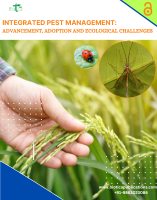 |
2025-03-26 08:42:33 |
Edit |
Delete |
| 16 |
|
|
Upcoming Book |
ID 08 New Dimensions in Molecular Entomology |
Open Access |
Coming soon |
Coming soon |
Background
In the realm of entomology, the microscopic world holds immense potential for unraveling mysteries and revolutionizing our understanding of insect behavior, genetics and resistance mechanisms. "New Dimensions in Molecular Entomology" delves into the forefront of scientific exploration, showcasing innovative approaches and groundbreaking discoveries that promise to reshape the landscape of insect research. It will serve as a gateway to the cutting-edge methodologies driving the field forward. From CRISPR/Cas9 gene editing to single-cell sequencing technologies, researchers are equipped with powerful tools to dissect the molecular intricacies of insect biology. The humble fruit fly, Drosophila melanogaster, emerges as a cornerstone of molecular entomology research. Beyond its role in classical genetics, modern advancements have elevated Drosophila to a premier model for studying neurobiology, behavior, and evolutionary genomics. Insects wield remarkable abilities to develop resistance to chemical interventions, posing significant challenges to pest management strategies. As we venture deeper into the molecular realm, the boundaries of our understanding continue to expand, offering new vistas for exploration and discovery in the captivating world of insects. We hope that students, scholars and professors interested in molecular entomology will find this book informative.
Tentative Titles/Themes of Chapter (New chapter titles may be proposed)
Theme 1: Introduction
Chapter 1: Introduction to Molecular Entomology
Overview and importance of molecular approaches in entomology.
Theme 2: DNA, Gene Structure, and DNA Replication
Chapter 1: DNA Structure and Function in Insects
Basic DNA structure, function, and unique features in insects.
Chapter 2: Mechanisms of DNA Replication in Insects
Detailed processes and enzymes involved in insect DNA replication.
Theme 3: Transcription, Translation, and Regulation of Eukaryotic DNA
Chapter 1: Transcriptional Regulation in Insects
Mechanisms and factors influencing transcription in insect cells.
Chapter 2: Post-Transcriptional Modifications and mRNA Processing
mRNA splicing, editing, and transport in insects.
Chapter 3: Translation and Protein Synthesis in Insects
Ribosome function, tRNA, and translation initiation in insects.
Chapter 4: Regulation of Gene Expression in Insects
Epigenetic modifications and non-coding RNAs in gene regulation.
Theme 4: Nuclear and Extranuclear DNA in Insects
Chapter 1: Nuclear Genome Organization in Insects
Chromatin structure and nuclear architecture.
Chapter 2: Mitochondrial DNA and Its Role in Insects
Mitochondrial genome organization, replication, and inheritance.
Chapter 3: Endosymbiotic DNA in Insects
DNA from endosymbionts and its integration into the insect genome.
Theme 5: Genetic Systems, Genome Evolution, and Genetic Control of Embryonic Development in Insects
Chapter 1: Genetic Systems and Genome Evolution in Insects
Comparative genomics and evolutionary genetics.
Chapter 2: Genetic Control of Embryogenesis in Insects
Key genes and pathways controlling early development.
Chapter 3: Hox Genes and Body Patterning in Insects
Role of Hox genes in segmental identity and development.
Theme 6: Basic Tools in Molecular Entomology
Chapter 1: Techniques for DNA Isolation and Purification in Insects
Methods for extracting high-quality DNA from insect tissues.
Chapter 2: Restriction Enzymes and DNA Ligation
Principles and applications of restriction enzymes and ligases.
Chapter 3: DNA Cloning and Vector Design
Cloning strategies and vector construction.
Chapter 4: Quantitative PCR and Real-Time PCR
Techniques for DNA quantification and gene expression analysis.
Chapter 5: Visualization of DNA: Gel Electrophoresis and Beyond
Methods for DNA visualization and size determination.
Theme 7: DNA Sequencing and the Evolution of the “-Omics”
Chapter 1: Next-Generation Sequencing in Insect Genomics
High-throughput sequencing technologies and their applications.
Chapter 2: Transcriptomics in Insects
RNA-seq and its role in studying insect gene expression.
Chapter 3: Proteomics and Metabolomics in Insects
Techniques for protein and metabolite analysis in insects.
Chapter 4: Bioinformatics Tools for Insect Genomics
Computational approaches for analyzing genomic data.
Theme 8: DNA Amplification by the Polymerase Chain Reaction
Chapter 1: Polymerase Chain Reaction (PCR) in Insect Studies
Basic principles and applications of PCR.
Chapter 2: Advanced PCR Techniques: Nested, Multiplex, and Digital PCR
Variations and specialized PCR methods.
Theme 9: Molecular Genetics of Insecticide Resistance
Chapter 1: Genetic Basis of Insecticide Resistance
Mechanisms and genes involved in resistance.
Chapter 2: Molecular Diagnostics of Insecticide Resistance
Techniques for detecting resistance alleles.
Theme 10: Genetic Modification of Insects
Chapter 1: Transposable Elements and Their Applications
Use of transposons for genetic manipulation.
Chapter 2: Gene Editing with CRISPR-Cas in Insects
Applications and advancements in CRISPR technology.
Chapter 3: RNA Interference (RNAi) for Gene Silencing in Insects
Mechanisms and applications of RNAi.
Theme 11: Sex Determination in Insects
Chapter 1: Genetic and Environmental Determinants of Sex in Insects
Mechanisms of sex determination and differentiation.
Theme 12: Molecular Genetics of Insect Behavior
Chapter 1: Genetic Control of Insect Behavior
Genes influencing feeding, mating, and social behavior.
Chapter 2: Neurogenetics of Insect Behavior
Role of the nervous system in behavioral regulation.
Theme 13: Molecular Systematics and Phylogenetics
Chapter 1: Molecular Systematics of Arthropods
Phylogenetic relationships among arthropod groups.
Chapter 2: Molecular Phylogenetics in Insect Classification
Use of molecular data in insect taxonomy.
Theme 14: Insect Population Genetics
Chapter 1: Population Genetics and Evolution in Insects
Genetic variation and evolutionary processes.
Chapter 2: Molecular Markers in Insect Population Studies
Use of microsatellites, SNPs, and other markers.
Theme 15: Genetic Engineering for Pest Management
Chapter 1: Genetic Control of Pest Populations
Strategies for population suppression or eradication.
Chapter 2: Genetic Engineering of Beneficial Insects
Enhancing traits for biological control agents.
Theme 16: Insect Viruses and Pathogens
Chapter 1: Molecular Biology of Insect Viruses
Virus-host interactions and viral genetics.
Chapter 2: Pathogen Resistance in Insects
Genetic basis of resistance to pathogens.
Theme 17: Molecular Methods in Insect Phylogenetics
Chapter 1: Molecular Tools for Studying Insect Evolution
Techniques for reconstructing phylogenies.
Theme 18: Drosophila melanogaster as a Model Organism
Chapter 1: Molecular Population Genetics of Drosophila
Studies on genetic diversity and population structure.
Chapter 2: Cellular Pattern Formation in Drosophila Eye Development
Genetic control of eye morphogenesis.
Chapter 3: Molecular Genetics of Sex Determination in Drosophila
Mechanisms of sex determination.
Chapter 4: Biological Rhythms and Clock Genes in Drosophila
Genetic control of circadian rhythms.
Theme 19: Meiosis and Sex Ratio Distortion
Chapter 1: Mechanisms of Meiosis in Insects
Genetic control of meiotic processes.
Chapter 2: Sex Ratio Distortion and Its Genetic Basis
Causes and consequences of sex ratio distortion.
Theme 20: Gene Transfer Techniques
Chapter 1: Gene Transfer Methods in Insects
Techniques for introducing foreign genes into insects.
Chapter 2: Applications of Gene Transfer in Research and Pest Control
Practical uses of gene transfer technology.
Theme 21: Future Directions
Chapter 1: Future Perspectives in Molecular Entomology
Emerging trends and future research directions.
**Note: Chapter title may be modified or new chapter may also be proposed by the author.
CHAPTER SUBMISSION PROCEDURE:
Book Chapter may be submitted through e-mail: bioticabooks@gmail.com
FOR ANY QUERIES:
Contact:+91-9863023086
Mail us: bioticabooks@gmail.com
Authors' Guidelines Publication Package
|
|
IMPORTANT DATES:
Chapter booking ends: 25th April, 2025
Chapter submission ends: 25th May, 2025
CHAPTER SUBMISSION PROCEDURE:
Book Chapter may be submitted through e-mail: bioticabooks@gmail.com
FOR ANY QUERIES:
Contact:+91-9863023086
Mail us: bioticabooks@gmail.com
Authors' Guidelines Publication Package
|
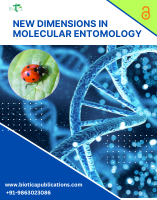 |
2025-03-26 08:33:36 |
Edit |
Delete |
| 17 |
|
|
Upcoming Book |
ID 05 Cutting-Edge Research in Sericulture: Enhancing Productivity and Quality |
N. Sakthivel, Ramakrishna Naika, B. Sannappa, P. Kumaresan, L. Muthulakshmi, P. Priyadharshini |
Coming soon |
978-81-980121-6-6 |
Background
The book delves into the latest advancements in sericulture, emphasizing innovative methods to boost both the yield and quality of silk production. This comprehensive volume explores genetic improvements in silkworms, including the development of transgenic strains that exhibit enhanced disease resistance and superior silk properties. The book also highlights advancements in mulberry cultivation, such as the introduction of high-yield, pest-resistant varieties and optimized agronomic practices. Biotechnology plays a pivotal role, with breakthroughs in molecular markers and genomic tools aiding in the selection and breeding of silkworms and mulberry plants. Additionally, the integration of modern technologies like IoT and AI in sericulture management is discussed, showcasing their potential in monitoring and optimizing environmental conditions, thus ensuring optimal growth and productivity. The compilation of recent research underscores the importance of sustainable practices and the use of organic methods to improve the quality of silk while minimizing environmental impact. By bringing together contributions from leading scientists and experts in the field, the book serves as a vital resource for researchers, practitioners, and policymakers aiming to enhance the efficiency and sustainability of sericulture.
Tentative Titles/Themes of Chapter (New chapter titles may be proposed)
Theme A: Feeding Potential and Nutrition
Sub-Theme: Nutritional Requirements of Silkworms: Current Understanding
Chapter 1: Feeding the Future: Insights into Silkworm Nutrition
Sub-Theme: Innovative Feeding Strategies for Enhanced Silk Production
Chapter 2: Next-Gen Nutrition: Boosting Silk Yield with Innovative Feeds
Sub-Theme: Alternative Feed Sources for Silkworms
Chapter 3: Beyond Mulberry: Exploring Alternative Silkworm Feeds
Sub-Theme: Optimizing Mulberry Cultivation for Silkworm Nutrition
Chapter 4: Perfecting Mulberry: Techniques for Optimal Silkworm Nutrition
Sub-Theme: Role of Micronutrients in Silkworm Health and Productivity
Chapter 5: Micronutrient Magic: Enhancing Silkworm Health and Silk Quality
Sub-Theme: Impact of Diet on Silk Quality and Yield
Chapter 6: Diet Dynamics: Linking Silkworm Nutrition to Silk Excellence
Theme B: Modern Rearing Techniques
Sub-Theme: Innovations in Silkworm Rearing Techniques
Chapter 7: Rearing Revolution: Innovations in Silkworm Cultivation
Sub-Theme: Automation in Sericulture: Tools and Technologies
Chapter 8: Automated Sericulture: Embracing Technology for Efficiency
Sub-Theme: Environmental Control in Silkworm Rearing
Chapter 9: Climate Control: Optimizing Environment for Silkworms
Sub-Theme: Organic Sericulture: Practices and Certification
Chapter 10: Going Green: Organic Practices in Sericulture
Sub-Theme: Sustainable Sericulture: Reducing Environmental Impact
Chapter 11: Sustainable Silk: Practices for an Eco-Friendly Industry
Theme C: Silk Production and Applications
Sub-Theme: Advances in Silk Production Technologies
Chapter 12: Silk Synergy: Cutting-Edge Production Technologies
Sub-Theme: Quality Control in Silk Production
Chapter 13: Silk Standard: Ensuring Quality in Production
Sub-Theme: Innovative Applications of Silk: From Textiles to Biomedicine
Chapter 14: Beyond Fabric: Revolutionary Uses of Silk
Sub-Theme: Silk-Based Biomaterials: Current Research and Future Prospects
Chapter 15: BioSilk: Exploring Silk in Biomedicine and Beyond
Sub-Theme: Value Addition in Silk: Enhancing Marketability
Chapter 16: Silk Success: Strategies for Value Addition and Market Growth
Theme D: Genetics and Breeding
Sub-Theme: Introduction to Sericulture: History and Modern Developments
Chapter 17: A Journey Through Time: The Evolution of Sericulture
Sub-Theme: Genetics of Silkworm: An Overview
Chapter 18: Unraveling the Genetic Mysteries of Silkworms
Sub-Theme: Advances in Silkworm Genomics
Chapter 19: Decoding the Silkworm Genome: Breakthroughs and Insights
Sub-Theme: Silkworm Breeding: Traditional and Modern Approaches
Chapter 20: From Tradition to Innovation: The Art and Science of Silkworm Breeding
Sub-Theme: Genetic Engineering in Silkworms: Techniques and Applications
Chapter 21: Engineering Excellence: Cutting-Edge Techniques in Silkworm Genetics
Sub-Theme: Marker-Assisted Selection in Silkworm Breeding
Chapter 22: Precision Breeding: Harnessing Marker-Assisted Selection
Sub-Theme: CRISPR/Cas9 Technology in Silkworm Research
Chapter 23: CRISPR Revolution: Editing the Silkworm Genome
Sub-Theme: Molecular Breeding for Disease Resistance in Silkworms
Chapter 24: Fortifying Silkworms: Molecular Strategies for Disease Resistance
Sub-Theme: Exploring New Species of Silkworms: Potential and Challenges
Chapter 25: New Horizons: Discovering and Breeding Novel Silkworm Species
Sub-Theme: Transgenic Silkworms: Progress and Prospects
Chapter 26: Transgenic Triumphs: The Future of Silkworm Innovation
Theme E: Diseases and Pests of Silkworm
Sub-Theme: Overview of Silkworm Diseases
Chapter 27: Silkworm Health: An Overview of Common Diseases
Sub-Theme: Viral Diseases in Silkworms: Identification and Management
Chapter 28: Battling Silkworm Viruses: Detection and Control Strategies
Sub-Theme: Bacterial Diseases in Silkworms: Diagnosis and Control
Chapter 29: Bacterial Battles: Managing Silkworm Infections
Sub-Theme: Fungal Diseases in Silkworms: Prevention and Treatment
Chapter 30: Fungal Foes: Preventing and Treating Silkworm Fungal Infections
Sub-Theme: Protozoan Diseases in Silkworms: Current Research
Chapter 31: Protozoan Perils: Advances in Research and Management
Sub-Theme: Integrated Pest Management in Sericulture
Chapter 32: Holistic Protection: Integrated Pest Management for Silkworms
Sub-Theme: Biological Control of Silkworm Pests
Chapter 33: Nature's Allies: Biological Control Agents in Sericulture
Theme F: Microbial and Biological Control
Sub-Theme: Microbial Interactions in Silkworm Rearing
Chapter 34: Microbial Marvels: Understanding Silkworm-Microbe Interactions
Sub-Theme: Beneficial Microbes in Silkworm Health
Chapter 35: Microbe Boost: Enhancing Silkworm Health with Beneficial Microbes
Sub-Theme: Probiotics in Sericulture: Enhancing Silkworm Growth and Immunity
Chapter 36: Probiotic Power: Boosting Silkworm Growth and Immunity
Sub-Theme: Biological Control Agents in Sericulture: Current Trends
Chapter 37: Biological Best Practices: Current Trends in Silkworm Pest Control
Sub-Theme: Parasitoids of Silkworm: Identification and Utilization
Chapter 38: Parasitoid Partners: Harnessing Natural Enemies for Silkworm Protection
Sub-Theme: Entomopathogenic Fungi in Silkworm Pest Management
Chapter 39: Fungal Fighters: Using Entomopathogenic Fungi Against Silkworm Pests
Theme G: Global Perspectives
Sub-Theme: Global Trends in Sericulture: An Overview
Chapter 40: Global Sericulture: Trends Shaping the Future
Sub-Theme: Sericulture in Asia: Success Stories and Challenges
Chapter 41: Asian Excellence: Success Stories and Challenges in Sericulture
Sub-Theme: Sericulture in Africa: Opportunities and Developments
Chapter 42: African Aspirations: Opportunities in Modern Sericulture
Sub-Theme: European Perspectives on Sericulture
Chapter 43: European Endeavors: Sericulture in the European Context
Sub-Theme: Sericulture in the Americas: Current Status and Future Prospects
Chapter 44: American Ambitions: The Future of Sericulture in the Americas
Sub-Theme: International Collaboration in Sericulture Research
Chapter 45: United for Silk: Global Collaborations in Sericulture Research
Theme H: Silkworm as a Protein Source
Sub-Theme: Nutritional Profile of Silkworms: A Protein-Rich Food Source
Chapter 46: Silkworm Superfood: Nutritional Benefits and Applications
Sub-Theme: Processing and Utilization of Silkworms for Human Consumption
Chapter 47: From Cocoon to Cuisine: Processing Silkworms for Food
Sub-Theme: Silkworms in Animal Feed: Potential and Benefits
Chapter 48: Feeding Innovation: Silkworms as a Sustainable Feed Source
Sub-Theme: Regulatory Aspects of Using Silkworms as Food and Feed
Chapter 49: Navigating Norms: Regulations for Silkworm-Based Foods and Feeds
Theme I: Entrepreneurship and Marketing
Sub-Theme: Entrepreneurship in Sericulture: Opportunities and Challenges
Chapter 50: Silk Startups: Navigating the Sericulture Business Landscape
Sub-Theme: Marketing Strategies for Sericulture Products
Chapter 51: Selling Silk: Effective Marketing Strategies
Sub-Theme: Economic Viability of Sericulture: Case Studies
Chapter 52: Silk Economics: Real-World Success Stories
Sub-Theme: Government Policies and Support for Sericulture Entrepreneurs
Chapter 53: Policy Support: Government Initiatives for Sericulture Entrepreneurs
Sub-Theme: E-commerce and Digital Marketing in Sericulture
Chapter 54: Digital Silk: Leveraging E-commerce and Online Marketing
Editorial Board
Chief Editor
Dr. N. Sakthivel
Scientist - D & Head, Mulberry Division
Central Sericultural Germplasm Resources Centre (CSGRC)
Central Silk Board, Government of India
Post Box No. 44, Thally Road, Hosur - 635 109
Krishnagiri District, Tamil Nadu, India
Mobile: (+91) 98427 61789 & 82480 67939
Email: drnsakthivelcsb@gmail.com
Associate Editors
Dr. Ramakrishna Naika,
Professor & Head
Department of Crop Protection and Sericulture,
College of Sericulture, UAS (B),
Chintamani - 563125
Karnataka
Dr. Sannappa
Professor
Department of Sericulture Science
University of Mysore
Manasagangotri
Mysore - 570 006
Dr. P. Kumaresan
Scientist-D(S.M)
Central Silk Board, B.T.M.Layout
Madiwala, Bangalore - 560068
Dr. L. Muthulakshmi
Associate Professor
Department of Biotechnology
Kalasalingam Academy of Research and Education
Krishnankoil , Srivilliputtur - 626 126
Tamil Nadu
Dr. P.Priyadharshini
Assistant Professor (Sericulture)
Department of Sericulture
Forest College and Research Institute
Tamil Nadu Agricultural University
Mettupalayam - 641 301
CHAPTER SUBMISSION PROCEDURE:
Book Chapter may be submitted through e-mail: bioticabooks@gmail.com
FOR ANY QUERIES:
Contact:+91-9863023086
Mail us: bioticabooks@gmail.com
Authors' Guidelines Publication Package
|
Uploading...
|
IMPORTANT DATES:
- Chapter booking ends: 25th April, 2025
- Chapter submission ends: 25th May, 2025
CHAPTER SUBMISSION PROCEDURE:
Book Chapter may be submitted through e-mail: bioticabooks@gmail.com
FOR ANY QUERIES:
Contact:+91-9863023086
Mail us: bioticabooks@gmail.com
Authors' Guidelines Publication Package
|
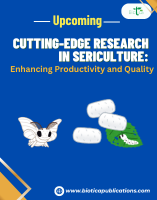 |
2025-03-26 07:55:12 |
Edit |
Delete |
| 18 |
|
|
Upcoming Book |
ID 04 Progress and Prospects in Oilseed Crops Research |
Mustard, Rapeseed, Groundnut, Sesame, Sunflower, Safflower, Soybean, Niger |
Coming soon |
Coming soon |
Background
The book delves into cutting-edge research and innovative approaches aimed at enhancing the productivity and sustainability of oilseed crops. The book comprehensively covers advanced genomics and modern breeding techniques that pave the way for developing high-yielding and stress-tolerant varieties. It highlights the integration of genomics in addressing abiotic stresses, including drought tolerance in rapeseed-mustard through both conventional and molecular approaches and the genomic designing for sesame resistance to various stresses. The performance trends, prospects and constraints of key oilseed crops like soybean, rapeseed and mustard are analyzed, providing insights into recent advancements and future directions. The book also explores biotic and abiotic stress management, emphasizing innovative pest and disease control strategies, nutrient management and sustainable weed management practices. Intercropping, zero tillage and other sustainable agricultural practices are examined to enhance oilseed production efficiency. Overall, this book serves as an essential resource for researchers, agronomists, and policymakers seeking to leverage modern scientific advancements for the improvement of oilseed crops, ensuring food security and economic sustainability.
Tentative Titles/Themes of Chapter (New chapter titles may be proposed)
Theme I: Genomics and Modern Breeding Techniques
-
Introduction to Oilseed Crops: Significance and Global Impact
-
Genomics of Oilseed Crops: An Overview
-
Advances in Oilseed Crop Genomics
-
Modern Breeding Techniques in Oilseed Crops
-
CRISPR/Cas9 Applications in Oilseed Breeding
-
Marker-Assisted Selection in Oilseed Crop Improvement
-
Genomic Selection in Oilseed Crops: Progress and Prospects
-
Transcriptomics in Oilseed Crops
-
Proteomics and Metabolomics in Oilseed Research
-
Genome-Wide Association Studies (GWAS) in Oilseed Crops
Theme II: Promising Varieties and Genetic Improvement
-
Development of High-Yielding Mustard Varieties
-
Promising Varieties of Sesame: Characteristics and Performance
-
Recent Advances in Sunflower Breeding
-
Innovative Varieties of Groundnut
-
Soybean Varieties: Recent Developments and Future Directions
-
Castor Crop Improvement: Breeding and Biotechnology
-
Genetic Enhancement of Flax for Oil Quality
-
Hybrid Breeding in Oilseed Crops
-
Biofortification of Oilseeds: Enhancing Nutritional Value
-
Genetic Resources and Germplasm Conservation in Oilseeds
Theme III: Biotic and Abiotic Stress Management
-
Biotic Stress Resistance in Oilseed Crops
-
Abiotic Stress Tolerance in Oilseeds: Genomic Approaches
-
Pest and Disease Management in Mustard and Rapeseed
-
Weed Management Strategies in Oilseed Crops
-
Drought Tolerance in Rapeseed-Mustard: Conventional and Molecular Approaches
-
Salt Tolerance in Oilseed Crops: Mechanisms and Management
-
Genomic Designing for Sesame Resistance to Abiotic Stresses
-
Integrated Pest Management (IPM) in Oilseed Crops
-
Biological Control of Pests and Diseases in Oilseeds
-
Impact of Climate Change on Oilseed Crop Production
Theme IV: Agronomic Practices and Sustainable Farming
-
Nutrient Management in Oilseed Crops
-
Intercropping Systems with Oilseed Crops
-
Zero Tillage in Oilseed Farming: Benefits and Challenges
-
Sustainable Practices in Oilseed Crop Production
-
Precision Agriculture in Oilseed Farming
-
Water Management in Oilseed Crop Cultivation
-
Organic Farming of Oilseed Crops
-
Role of Biofertilizers in Oilseed Production
-
Soil Health and Fertility Management in Oilseed Crops
-
Integrated Crop Management for Oilseeds
Theme V: Performance and Prospects of Major Oilseed Crops
-
Overview of the Oilseeds Sector: Current Status and Growth Behaviour
-
Performance of Soybean: Recent Trends, Prospects and Constraints
-
Performance of Rapeseed and Mustard: Recent Trends, Prospects and Constraints
-
Future Prospects of Sunflower Cultivation
-
Groundnut Production: Challenges and Opportunities
-
Economic Importance of Castor and its By-products
-
Flaxseed Production and Market Trends
-
Sustainable Development Goals and Oilseed Crop Production
-
Policy and Regulatory Frameworks for Oilseed Crop Improvement
-
Future Directions in Oilseed Crop Research
-
**Chapter may be written on individual oilseed crop, wherever applicable and chapter title may also be modified by the author
CHAPTER SUBMISSION PROCEDURE:
Book Chapter may be submitted through e-mail: bioticabooks@gmail.com
FOR ANY QUERIES:
Contact:+91-9863023086
Mail us: bioticabooks@gmail.com
Authors' Guidelines Publication Package
|
Uploading...
|
IMPORTANT DATES:
- Chapter booking ends: 25th April, 2025
- Chapter submission ends: 25th May, 2025
CHAPTER SUBMISSION PROCEDURE:
Book Chapter may be submitted through e-mail: bioticabooks@gmail.com
FOR ANY QUERIES:
Contact:+91-9863023086
Mail us: bioticabooks@gmail.com
Authors' Guidelines Publication Package
|
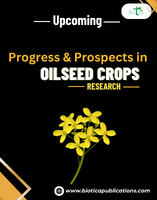 |
2025-03-26 07:51:01 |
Edit |
Delete |
| 19 |
|
|
Upcoming Book |
ID 03 Progress and Prospects in Pulse Crop Research |
Bengal Gram, Pigeon Pea, Green Gram, Chick Pea, Black Gram, Red Kidney Beans (Rajma), Black Eyed Peas (Lobiya), Lentil, Field Pea |
Coming soon |
Coming soon |
Background
It offers a comprehensive exploration of the latest advancements and future directions in pulse crop research, addressing key aspects such as genomics, modern breeding techniques, and sustainable agronomic practices. This book delves into the development of high-yielding and climate-resilient pulse varieties, biotic and abiotic stress management strategies, and innovative processing and value addition technologies. Each chapter is meticulously curated to provide in-depth knowledge and practical insights into enhancing pulse crop productivity and quality. For students, scholars, and researchers, this book serves as an invaluable resource, bridging the gap between foundational knowledge and cutting-edge research, and offering essential guidance for understanding pulse crop biology, modern agricultural practices, and emerging research directions.
Tentative Titles/Themes of Chapter (New chapter titles may be proposed)
Theme A: Agronomic Practices and Sustainable Farming
-
Sustainable Agronomic Practices for Pulse Production
-
Crop Rotation and Intercropping with Pulses for Soil Health
-
Conservation Tillage in Pulse Crops
-
Organic Farming Practices in Pulse Crop Cultivation
-
Precision Agriculture Techniques for Pulse Farming
-
Water Management Strategies for Pulse Crops
-
Integrated Nutrient Management in Pulse Production
-
Soil Health and Fertility Management in Pulse Crops
-
Role of Cover Crops in Sustainable Pulse Farming
-
Agroecological Approaches to Pulse Crop Cultivation
Theme B: Biotic and Abiotic Stress Management
-
Integrated Pest Management in Pulse Crops
-
Biotechnological Approaches to Disease Resistance in Pulses
-
Abiotic Stress Tolerance Mechanisms in Pulse Crops
-
Utilizing Endophytes for Stress Management in Pulses
-
Breeding Pulses for Resistance to Major Pests
-
Advances in Biocontrol Methods for Pulse Crop Protection
-
Drought Tolerance in Pulses: Breeding and Management
-
Heat Stress Mitigation in Pulse Crops
-
Role of Mycorrhizae in Enhancing Pulse Crop Resilience
-
Salinity Tolerance Strategies in Pulse Crop Production
Theme C: Genomics and Modern Breeding Techniques
-
Harnessing Genomic Tools for Pulse Crop Improvement
-
CRISPR/Cas9: Revolutionizing Pulse Crop Breeding
-
Genomic Selection in Pulses: Strategies and Applications
-
Pangenomics of Pulse Crops: A Comprehensive Insight
-
Marker-Assisted Selection in Pulse Crop Breeding
-
Transcriptome Analysis for Trait Improvement in Pulses
-
Genome Editing for Disease Resistance in Pulses
-
Utilizing GWAS for Enhancing Pulse Crop Yields
-
Epigenetic Modifications and Their Role in Pulse Crop Improvement
-
Integrating Bioinformatics in Pulse Genomics
Theme D: Promising Varieties and Genetic Improvement
-
High-Yielding Pulse Varieties: Recent Developments
-
Genetic Diversity and its Role in Pulse Crop Enhancement
-
Development of Climate-Resilient Pulse Varieties
-
Interspecific Hybridization for Pulse Improvement
-
Exploring Wild Relatives for Pulse Crop Genetic Enhancement
-
Advanced Breeding Techniques for Protein-Rich Pulses
-
Nutritional Biofortification of Pulses: Progress and Prospects
-
Molecular Breeding for Abiotic Stress Tolerance in Pulses
-
Genetic Approaches to Improve Pulse Crop Quality
-
Breeding Pulses for Enhanced Nutrient Use Efficiency
Theme E: Processing and Value Addition
-
Innovations in Pulse Crop Processing Technologies
-
Value-Added Products from Pulses: Opportunities and Challenges
-
Nutritional Enhancements through Pulse Processing
-
Post-Harvest Management and Processing of Pulses
-
Pulse-Based Functional Foods: Development and Market Potential
-
Bioactive Compounds in Pulses: Extraction and Applications
-
Pulses in the Food Industry: Trends and Innovations
-
Economic Viability of Pulse Processing and Value Addition
-
Sustainable Packaging Solutions for Pulse Products
-
Pulse Protein Isolates: Extraction, Functional Properties, and Applications
**Note: Chapter title may be modified or new chapter may also be proposed by the author.
CHAPTER SUBMISSION PROCEDURE:
Book Chapter may be submitted through e-mail: bioticabooks@gmail.com
FOR ANY QUERIES:
Contact:+91-9863023086
Mail us: bioticabooks@gmail.com
Authors' Guidelines Publication Package
|
Coming Soon...
|
IMPORTANT DATES:
Chapter booking ends: 25th April, 2025
Chapter submission ends: 25th May, 2025
CHAPTER SUBMISSION PROCEDURE:
Book Chapter may be submitted through e-mail: bioticabooks@gmail.com
FOR ANY QUERIES:
Contact:+91-9863023086
Mail us: bioticabooks@gmail.com
Authors' Guidelines Publication Package
|
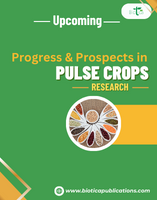 |
2025-03-26 07:44:30 |
Edit |
Delete |
| 20 |
|
|
Upcoming Book |
ID 02 Progress and Prospects in Cereal Crops Research |
Raihana Habib Kanth, Monika Ray, Joy Kumar Dey, Prajjal Dey, Ardhendu Chakraborty |
Coming soon |
978-81-980121-7-3 |
Background
It offers a comprehensive examination of recent advancements and future directions in cereal crop science, emphasizing climate resilience, genomics, precision farming, RNA interference (RNAi), policy frameworks, soil and nutrient health, and biotic and abiotic stress management. The book highlights the integration of next generation sequencing and genome editing technologies, such as CRISPR, to accelerate breeding programs and develop stress-tolerant varieties. It explores precision farming techniques to optimize inputs and enhance productivity, as well as RNAi applications for pest and disease resistance. Additionally, the book addresses sustainable soil and nutrient management practices and the importance of supportive policy frameworks in promoting agricultural innovation. By bridging scientific research with practical applications, this volume serves as a vital resource for advancing cereal crop production and ensuring global food security.
Tentative Titles/Themes of Chapter (New chapter titles may be proposed)
Part I: Agronomy and Crop Management
Chapter 1: Innovative Agronomic Practices for Cereal Crops
Chapter 2: Precision Agriculture in Cereal Crop Production
Chapter 3: Soil Health and Nutrient Management in Cereal Farming
Chapter 4: Water Management Strategies in Cereal Crop Production
Chapter 5: Crop Rotation and Intercropping Systems in Cereal Farming
Chapter 6: Mechanization and Automation in Cereal Crop Production
Part II: Advanced Breeding and Biotechnology
Chapter 7: Molecular Breeding for Stress Tolerance in Cereal Crops
Chapter 8: Transgenic Approaches for Disease Resistance in Cereal Crops
Chapter 9: Nanotechnology in Cereal Crop Improvement
Chapter 10: Genome-Wide Association Studies (GWAS) in Cereal Crops
Chapter 11: RNA Interference (RNAi) for Gene Silencing in Cereal Crops
Chapter 12: Proteomics and Metabolomics in Cereal Crop Research
Part III: Climate Resilience and Sustainable Practices
Chapter 13: Climate Resilient Cereal Crop Production Technology
Chapter 14: Sustainable Practices in Cereal Cultivation
Chapter 15: Biofortification of Cereal Crops: Enhancing Nutritional Quality
Chapter 16: Paddy Fish Culture: Integrating Aquaculture with Rice Farming
Chapter 17: Raised and Sunken Bed Farming: Techniques and Benefits
Chapter 18: Sensor-Based Phenotyping for Stress Tolerance in Cereal Crops
Part IV: Genomic Resources and Crop Improvement
Chapter 19: Progress and Challenges of Crop Genomes
Chapter 20: Genomic Resources for Crop Improvement
Chapter 21: Next-Generation Sequencing Technologies: Approaches and Applications for Crop Improvement
Chapter 22: CRISPR Editing Events in Transgenic Wheat: Analyzing with Next-Generation Sequencing
Chapter 23: Virus-Induced Gene Silencing: A Tool to Study Gene Function in Wheat
Chapter 24: Common Genomic Tools and Their Implementations in Genetic Improvement of Cereals
Chapter 25: Introduction to Marker-Assisted Selection in Wheat/Rice Breeding
Chapter 26: Chemical and Physical Mutagenesis Approaches for Herbicide and Drought Tolerance in Wheat/Rice
Chapter 27: A Modular Cloning Toolkit for Genome Editing in Cereals
Part V: Transcriptomics and Functional Genomics
Chapter 28: Reference-Based Transcriptomic Approach in Cereal Crops
Chapter 29: Transcriptome Data Analysis Using a De Novo Assembly Approach
Chapter 30: Functional Annotation of miRNAs in Rice Using ARMOUR
Chapter 31: QTL Interval Mapping for Agronomic and Quality Traits in Cereal Crops
Chapter 32: Tools and Techniques for Genomic Imprinting in Cereal Crops
Chapter 33: DNA Affinity Purification Sequencing (DAP-Seq) for Mapping Genome-Wide Transcription Factor Binding Sites in Plants
Chapter 34: Basics of Sensor-Based Phenotyping in Wheat
Chapter 35: Computational Methods for Receptor–Metabolite Interaction Studies in Cereal Crops
Part VI: Biotic and Abiotic Stresses
Chapter 36: Biotic Stresses in Cereal Crops: Pests and Diseases
Chapter 37: Abiotic Stresses in Cereal Crops: Salinity and Drought Tolerance
Chapter 38: Host Plant Resistance: Mechanisms and Applications
Chapter 39: Integrated Pest Management (IPM) in Wheat
Chapter 40: Integrated Pest Management (IPM) in Rice
Chapter 41: Integrated Disease Management (IDM) in Wheat
Chapter 42: Integrated Disease Management (IDM) in Rice
Chapter 43: Weed Management in Cereal Crops: Current Practices and Future Directions
Part VII: Genomics and Bioinformatics
Chapter 44: Advances in Cereal Crop Genomics
Chapter 45: Bioinformatics Tools for Cereal Crop Research
Chapter 46: Genome Editing Technologies: Beyond CRISPR
Chapter 47: High-Throughput Phenotyping in Cereal Crops
Chapter 48: Comparative Genomics of Cereal Crops
Chapter 49: Epigenomics in Cereal Crops: Current Status and Future Prospects
Part VIII: Economics and Policy
Chapter 50: Economics of Cereal Crop Production: Case Studies
Chapter 51: Policy and Regulatory Frameworks for Cereal Crop Improvement
**Chapter may be written on individual cereal crop, wherever applicable and chapter title also may be modified by the author
CHAPTER SUBMISSION PROCEDURE:
Book Chapter may be submitted through e-mail: bioticabooks@gmail.com
FOR ANY QUERIES:
Contact:+91-9863023086
Mail us: bioticabooks@gmail.com
Authors' Guidelines Publication Package
|
Uploading...
|
IMPORTANT DATES:
Chapter booking ends: 25th April, 2025
Chapter submission ends: 25th May, 2025
CHAPTER SUBMISSION PROCEDURE:
Book Chapter may be submitted through e-mail: bioticabooks@gmail.com
FOR ANY QUERIES:
Contact:+91-9863023086
Mail us: bioticabooks@gmail.com
Authors' Guidelines Publication Package
|
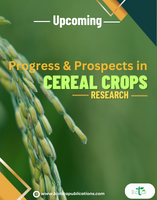 |
2025-03-26 07:41:35 |
Edit |
Delete |
